专业外语考试词汇部分.doc
431专业英语词汇

431专业英语词汇专业英语词汇在不同领域中有着不同的特点和用法。
以下是一些常见的专业英语词汇,涵盖了不同领域的词汇:1. 医学领域,anatomy(解剖学)、physiology(生理学)、pharmacy(药房)、diagnosis(诊断)、treatment(治疗)、surgery(手术)、vaccine(疫苗)、symptom(症状)、prescription(处方)等。
2. 工程领域,mechanical engineering(机械工程)、civil engineering(土木工程)、electrical engineering(电气工程)、computer engineering(计算机工程)、structural analysis(结构分析)、project management(项目管理)、quality control(质量控制)等。
3. 商业领域,marketing(市场营销)、finance(金融)、accounting(会计)、management(管理)、advertising(广告)、investment(投资)、entrepreneurship(创业精神)、business administration(工商管理)等。
4. 教育领域,pedagogy(教育学)、curriculum(课程设置)、instruction(教学)、assessment(评估)、classroom management(课堂管理)、educational psychology(教育心理学)、special education(特殊教育)等。
5. 科学领域,biology(生物学)、chemistry(化学)、physics(物理学)、astronomy(天文学)、geology(地质学)、environmental science(环境科学)、research(研究)、experiment(实验)等。
《计算机专业英语》考核说明.

计算机专业英语》考核说明一. 考核说明《计算机专业外语》是软件开发与应用专业(专科)的一门统设必修课程,总学时为72 学时,4 学分。
本课程主要通过对计算机专业英语语文章的学习,使学生掌握本专业常用英语词汇和习惯表达方式,提高英语阅读和翻译能力,能够从英文资料中获取知识,为熟练阅读英文的计算机技术文献、资料和书籍打下良好基础。
本课程要求的先修科目为:英语(1)(2),计算机应用基础,程序设计基础,软件技术基础。
现将有关考核的几个问题说明如下:(一)考核对象:电大理工科类软件开发与应用专业专科生及其他计算机专业的学生。
(二)考核依据:本课程所用教学大纲为2003年7 月审定通过并下发执行的、电大理工科类软件开发与应用专业专科生《计算机专业英语课程教学大纲》;所用文字教材为穆志纯主编的2004 年出版的《计算机专业英语》。
本课程考核说明是形成性考核和终结性考试命题的基本依据。
(三)考核方式:采用形成性考核和终结性考试相结合的方式。
1.课程总成绩的记分方法:形成性考核成绩在课程总成绩中占20%,终结性考试成绩在课程总成绩中占80%。
课程总成绩为百分制,60 分为合格。
2.形成性考核的要求和形式:形成性考核的形式主要是平时作业。
能够按时、按质、按量完成平时作业者方可得满分。
3.终结性考试的要求和形式:1)考试要求:考核重点是考察学员是否掌握计算机应用中的英语知识,包括常见的专业英语语法、句型、常用词组,并具有一定的翻译能力。
具体考核要求分为几个层次:熟练掌握:要求学生能够全面、深入理解和熟练掌握所学内容,例如专业英语课文中出现的基本专业词汇、词组和句型,以及其中涉及的计算机专业知识等,并能够在此基础上具备熟练运用基本专业英语词汇和词组的能力。
掌握:要求学生能够较好地理解和掌握相应内容,例如在掌握专业外语词汇和词组的基础上阅读和翻译难度适当的文献等。
了解:要求学生能够一般地了解所学内容,例如在课文后的补充阅读材料中出现的专业词汇、词组和涉及的计算机专业知识等。
2020年中石化专业职称外语考试试卷

中国石化集团公司专业技术人员外语水平考试英语(120分钟内完成)第一部分客观题(50分钟)一、词汇与用法(根据文意,从A、B、C、D四个选项中选择一个正确答案,共10分)1.I am looking _____ to seeing you in Beijing this May!A.upB. forwardC. towardD. down2. — John, is this your first time in China?— No, it’s my _____A. twoB. twiceC. threeD. third3. You should keep the meat in the fridge, ____it will go bad.A. soB. orC. andD. but4. — We’re going to Tianjin over the weekend. Why don't you join us?— ____, but I'm having a friend over.A. You're rightB. I don’t careC. I don't mindD. I'd love to5. The Smith family ______ all their fruit and vegetables, which saves money.A.plantB. produceC. growD. raise6. Tell Susan she should ______ worrying and get some rest.A.startB. stopC. sickD. stay7. The following day he found the old man lying in bed, ______.A. deadB. was deadC. dieD. has died8. Helen looked at the baby _____ love in her eyes.A. onB. inC. withD. at9. — My sister sent me a wonderful gift from Argentina.— Oh, is that so? ________________?A. Where is it fromB. What's it likeC. Who is it forD. Who sent it to you10. Having suffered ______ serious damage from war, it may be too difficult to restore the city.A.suchB. soC. tooD. many二、阅读理解(阅读下面的短文,根据文章内容,从每题所给的A、B、C、D四个选项中选择一个正确答案,共40分)短文一(10分)"When one of the doctors criticizes me, I get defensive. I feel like a child again, being scolded, and I want to explain that I'm not wrong." says Viola, a nurse. This is a common reaction to criticism, but not a good one. There are better ways of dealing with criticism. The following are three golden rules one can keep in mind when faced with such a situation.1. Try to be objective. When Sol was criticized by his new employer for not having made a sale, Sol's reaction was to feel sorry for himself. "I had put everything I had into making that sale," Sol says, "and I felt that I had failed as a person. I had to learn through experience not to react like that to each failure. "2. Take time to cool down. Rather than reacting immediately to criticism, take some time to think over what was said. Your first question should be whether the criticism is fair from the other person's position. The problem may be a simple misunderstanding of what you did or your reasons for doing it.3. Take positive actions. After you cool down, consider what you can do about the situation. The best answer may be "nothing". "I finally realized that my boss was having personal problems and taking them out on me because I was there," says Sheila. "His criticisms didn't really have anything to do with my work, so nothing I said or did was going to change them." In Sheila's case, the best way to deal with it was to leave her job. However, that's an extreme reaction. You may simply explain your opinion withoutexpecting an in-depth discussion. You may even decide that the battle isn't worth fighting this time. The key, in any case, is to have a reasonable plan.1. The word “reaction” in Paragraph 1 is closest in meaning to ____________.A. referenceB. reasonC. responseD. reminder2. When Sol faces criticism now, he will most likely ____________.A.think more objectivelyB.feel sorry for himselfC.try to make a saleD.feel like he has3. According to the writer, you should think about whether the criticism is fair from the other person’s perspective because ___________.A.other people’s opinions are valuableB.you need time to understand your own situationC.he may just have a misunderstanding of what you didD.he may want to have an in-depth discussion with you about it4. Sheila’s example in the fourth paragraph is to prove that the best way to deal with criticism is to _______.A.cool downB.do nothingC.leave her jobD.have a reasonable plan5. Which of the following statements is NOT true according to the passage?A.People should not get defensive when faced with criticism.B.People should avoid reacting immediately to criticism.C.People should take some time to think about the criticism they receive.D.People should explain their opinion when faced with criticism.短文二(10分)It's hard to think of an early retirement as anything other than a positive. Who wouldn't want to trade in their suit and tie for a pair of beach shorts?When considering early retirement, it is important that you prepare financially and in other aspects too. Some guys even think the ideal time to start planning and saving for an early retirement is while they start working. While retiring ahead of schedule may be easier on the body, a new set of research has found that it may not be so beneficial for the mind.The study, conducted at Binghamton University, finds that an early retirement can accelerate the usual rate of cognitive (认知的)decline among the elderly. The research team analyzed China's new rural pension (养老金) scheme (NRPS), as well as China's most recent Retirement Longitudinal Survey (CHARLS), in order to investigate the effects of early retirement and pension benefits on individual cognition among adults over the age of 60. For reference, CHARLS is a representative national survey of China's population over the age of 45 that tests respondents regarding mental cognition, episodic memory (情景记忆) and overall mental wellbeing.After going over all of the data, the research team noted a clear trend: individuals receiving pension benefits were experiencing much more rapid mental decline than their counterparts still on the workforce. The most prominent i ndicator of mental decline among retirees was delayed recall, a trait widely considered to be an accurate predictor of dementia. Surprisingly, females seemed to experience even sharper mental decline after retiring early. Overall, the results support the hypothesis that decreased mental activity accelerates cognitive decline.This study's findings were similar to previous research that had focused on the impact of retirement on elderly individuals living in the United States, England, and the European Union. So, this is hardly a trend limited to Asia.The researchers had actually conducted previous studies that found retirement led to a number of positive physical health benefits for retirees, such as improved sleep patterns, less stress, and reduced alcohol consumption. However, retirement is also usually accompanied with a decline in social activities and less overall interaction with people, which has also been linked to cognitive decline.6.Which of the following statements is TRUE according to Paragraph 1?A.Nobody likes early retirement for not being so beneficial for his mind.B.Early retirement is not a positive viewpoint for male but for female.C.Most people like early retirement, but it might not be good for their cognition.D.Everybody likes early retirement because he or she wouldn’t want trade in.7.Which of the following statements about CHARLS is NOT true?A.It is one of data resources of the study at Binghamton University.B.It involves financial preparation, pension and individual cognition.C.It is a nationwide survey of China's population over the age of 45.D.It involves mental cognition, recall and mental wellbeing.8.The word “indicator” in Paragraph 3 is closest in meaning to________.A.signB.thinkingC.dementiaD.impression9.Which of the following living patterns is mentioned as one of positive benefits of early retirement according to the passage?A.Less alcohol intake.B.More financial preparation.C.More life stress.D.Less social parties.10.It can be inferred from the passage that___________.A.the cognition of workers will increase more sharply after early retirementB.the impact of early retirement has a bit different between Asia and EuropeC.the increased mental activities accelerate the cognitive decline of retireesD.social activities are necessary for retirees as well as positive physical patterns短文三(10分)In the early days of the Internet, some people said that it was going to revolutionise the way that we manage our bank accounts. They predicted that all banking would eventually take place online. Banks which only exist online are, of course, much cheaper to run than traditional banks because they have lower staff and building costs. It seemed possible that the traditional street bank could disappear in the space of a few decades.However, these predictions have not come true and it seems unlikely that they will. The Internet has not replaced ordinary street banks. Instead it has just become one more way in which the bank can reach its customers. Indeed, customer surveys seem to agree that most customers want everything: a branch of their bank in the high street, a 24-hour ATM, and a way of checking their account online.Online banking is also not without its drawbacks. To begin with, the service requires a big investment on the part of the bank to make sure that the information technology is compatible with the computer systems in the branches. An even bigger problem is the possibility of fraud. One of the most common is so-called ‘phishing’. This is when fraudsters send out false emails, such as a fake job offer, to try to makepeople give their account details. They then use this personal or financial information to obtain money. This has affected a number of companies and, if it continues, some of customers may decide not to bank online.Despite this, there is evidence that banks which have developed a large number of online services can have a competitive advantage. It seems that online customers are more likely to buy extra banking products. For example, ING Direct, the online branch of the Dutch bank, gained a number of customers by offering online savings accounts with very competitive interest rates. They then increased their profits further by launching other products which targeted these same online customers. Online services seem, in short, a very good way for banks to market products to existing customers and to reinforce existing relationships.11. Which of the following statements does the passage support?A. The traditional bank will be substituted by online banking.B. Online banking offers new ways to connect with customers.C. Customers are more likely to buy banking products from street banks.D. It is much cheaper to run the traditional banks than online banks.12. It can be inferred from the passage that most bank customers want .A. longer opening time for traditional banksB. more products and services available onlineC. various ways of getting banking servicesD. more competitive online banking products13. What is Paragraph 3 mainly about?A. The problems with online banking.B. Why banks should offer online services.C. Why people shouldn’t bank online.D. How online banking can increase profits.14. The word “drawbacks”in Paragraph 3 is closest in meaning to .A. punishmentsB. abusesC. questionsD. disadvantages15. According to the passage, what is one of the reasons that customers may NOT want to bank online?A. Computer system may fail.B. Customers may receive some unwanted advertisements.C. Misoperating often occurs when banking online.D. Criminals may steal money from the account.短文四(10分)●本部分包含三篇文章,请根据个人工作专业方向,选择一篇作答。
英语专业四级历年词汇真题.docx
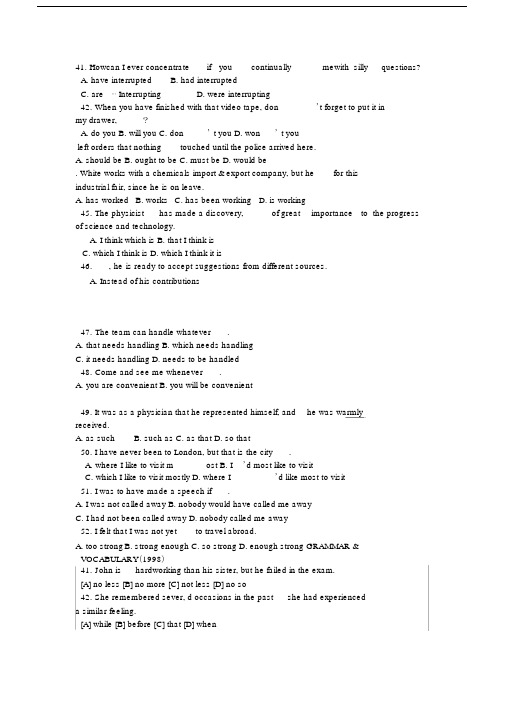
41. Howcan I ever concentrate if you ___ continually___ mewith silly questions?A. have interruptedB. had interruptedC. are⋯InterruptingD. were interrupting42. When you have finished with that video tape, don’t forget to put it inmy drawer, ___?A. do youB. will youC. don’ t youD. won’ t youleft orders that nothing ___ touched until the police arrived here.A. should beB. ought to beC. must beD. would be. White works with a chemicals import & export company, but he ___ for thisindustrial fair, since he is on leave.A. has workedB. worksC. has been workingD. is working45. The physicist has made a discovery, ___ of great importance to the progress of science and technology.A. I think which isB. that I think isC. which I think isD. which I think it is46.___, he is ready to accept suggestions from different sources.A. Instead of his contributions47.The team can handle whatever ___.A.that needs handlingB. which needs handlingC.it needs handlingD. needs to be handlede and see me whenever ___.A.you are convenientB. you will be convenient49. It was as a physician that he represented himself, and he was warmlyreceived.A. as suchB. such asC. as thatD. so that50. I have never been to London, but that is the city ___.A. where I like to visit m ostB. I’d most like to visitC. which I like to visit mostlyD. where I’d like most to visit51.I was to have made a speech if ___.A. I was not called awayB. nobody would have called me awayC. I had not been called awayD. nobody called me away52. I felt that I was not yet ___ to travel abroad.A. too strongB. strong enoughC. so strongD. enough strong GRAMMAR & VOCABULARY(1998)41. John is __ hardworking than his sister, but he failed in the exam.[A] no less [B] no more [C] not less [D] no so42.She remembered sever, d occasions in the past __ she had experienceda similar feeling.[A] while [B] before [C] that [D] when43.ff your car __ any attention during the first12 months, take it toan authorized dealer.[A] shall need[B] should need[C] would need[D] will need44. The indoor swimming pool seems to be a great deal more luxurious than__[A] is necessary [B] being necessary [C] to be necessary [D] it is necessary45.__, he can now only watch it on TV at home.[A]Obtaining not a ticket for the match[B]Not obtaining a ticket for the match[C]Not having obtained a ticket for the match[D ] Not obtained a ticket for the match46.The children prefer camping in the mountains __ an indoor activity.[A] to[B] than[C] for[D] withnguage belongs to each member of the society, to the cleaner__ tothe professor.[A] as far as[B] the same as[C] as much as[D] as long as48.__ he needed money for a new car, he decided not to borrow it from thebank.[A] Much as[B] Much though[C] As much[D] Though much49. The Clarks haven't decided yet which hotel[A] to stay[B] is to stay[C] to stay at[D] is for staying50.His strong sense of humor was __ make everyone in the room burst outlaughing.[A] so as to[B] such as to[C] so that[D] such that51. __ enough time and money, the researcher would have been able to discover more in this field.[A] Giving[B] To give[C] Given[D] Being given52. You __ Mark anything. It was none of his business.[A] needn ’t have told[B] needn't tell[C] mustn't have told[D] mustn't tell53. The membership card entitled him certain privileges in the dub.[A] on[B] in[C] at[D] toPart 5 GRAMMAR AND VOCABULARY (1999)___ seemed an endless wait, it was her turn to enter the personnel manager’s office.A. thatB. whatC. thereD.itthree men tried many times to sneak across the border into the neighboringcountry,___ by the police each time.A. had been capturedB. being always capturedC. only to be capturedD. unfortunately capturedJohnson is said ___some significant advance in his research in the past year.A. having madeB. makingC. to have made D to makecannot change into muscle ___ muscle changes into fat.A. any more thanB. no less than C no more than D. much more than is not so muchthe language ___ the cultural background that makes the bookdifficult to understand.A. butB. norC. asD. likeought to be less anxiety over the perceived risk of mountain climbing than___ in the public mind today.A. existsB. existC. existingD. to exist’ve never been to Lhasa, but that’s the city___.’d most l ike to visit B. where I like to visitC. which I like to visit mostlyD. I ’d like much to visit48. He ___ unwisely, but he was at least trying to do something helpful.A. may have actedB. must have actedC. should actD. would act49. If you have really been studying English for so long. you ___ able to write letters in English.A. should beB. wereC. must be D . are’s ___ as a “bellyacher ” —— he’s always complaining about something.A. who is knownB. whom is knownC. what is knownD. which is knownalways tries his best to complete it on time.A. However the task is hardB. However hard the task isC. Though hard the task isD. Though hard is the taskas ___, I couldn ’t lend him the money because I simply didn ’t have that much spare cash.A. I would have liked to should have to likeB. I would like to have should have liked toPartⅤ GRAMMAR AND VOCABULARY(2000)hearing helps most animals sense the approach of thunderstorm s long beforepeople___.A. doB. hearC. do themD. hearing itis an illness that can result in total blindness ___ left untreated.A. afterB. ifC. SinceD. unlesscentral provinces have floods in some years, and ___.A. drought in othersB. droughts are othersC. while other droughtsD. others in droughthelp yourself to some fruit,___ you?A. can ’tB. don ’tC. wouldn ’tD. won’tnothing more for discussion,the meeting came to an end half an hour earlier.A. to beB. to have beenC. beingD. bemother can ’t get ___ because she has rheumatism (风湿病).C.throughD.in47. I was very much put ___ by Mark’s rude behavior; it really anno yed me.B. offC. upD. by48. You ___ Jim anything about it. It was none of his business.A. needn ’t have toldB. needn ’t tellC. mustn ’t have toldD. mustn ’t tellof us would have enjoyed the party much more if there___ quite such a crowdof people there.A. weren ’tB. hasn ’t beenC. hadn ’t beenD.wouldn’t be50.Firms that use computers have found that the number of staff ___ quality control can be substantially reduced.A. whoseB. asC. whatD. that51. ___ at in this way, the present economic situation doesn’t seem so gloomy.A. LookingB.LookedC.Having lookedD.To look PartⅤGRAMMAR AND VOCABULARY(2001)can’t go — for one thing, I have no money, and ___ I have too much work.A. what’s moreB. as wellC. for anotherD.in addition42.Even as a girl, ___to be her life, and theater audiences were to be herbest teacher.A. performing by Melissa wereB. it was known that Melissa’s p erformances wereC. knowing that Melissa’s performances wereD. Melissa knew that performing washim tomorrow?A. Why not to call onB. Why don ’t call onC. Why not calling onD. Why not call onis no doubt ___the company has made the right decision on the sales project.A. whyB. thatC. whetherD. when is to the mind ___sight is to the body.A. whatB. asC. thatD. like sympathize, I can’t really do very much to help them out of the difficulties.A. As long asB. AsC. WhileD. Even patient ’s progress was very encouraging as he could ___ get out of bed without help.A. nearlyB. hardlyC. merelyD. barely48. He was ___to tell the truth even to his closest friend.A. too much of a cowardB. too much the cowardC. a coward enoughD. enough of a coward49.Barry had an advantage over his mother ___he could speak French.A. since thatB. in thatC. at thatD. so that50.You needn’t worry ___ regards the cost of the operation.A. withB. whichC. asD. about51.___ is not a serious disadvantage in life.A. To be not tallB. Not to be tallC. Being not tallD. Not being tall PartⅤ GRAMMAR & VOCABULARY [15 min] (2002)41. She did her work _________her manager had instructed.A. asB. untilC. WhenD. though42. _______ of the twins was arrested, because I saw both at a party last night.A. NoneB. BothC. NeitherD. All43. For some time now, world leaders _______ out the necessity for agreementon arms reduction.A. had been pointingB. have been pointingC. were pointingD. pointed44. Have you ever been in a situation______ you know the other person is right yet you cannot agree with him?A. by whichB. thatC. in whereD. where45. We’ve just installed two air-conditions in out apartment, _______should make great differences in our life next summer.A. WhichB. WhatC. thatD. they46.AID is said _________ the number-one killer of both men and womenover the past few years in that region.A. beingB. to beC. to have beenD. having been47. She managed to save ______ she could out of her wages to help her brother.A. how little moneyB. so little moneyC. such little moneyD. what little money48. Fool ____ Jane is, she could not have done such a thing.A. whoB. asC. thatD. like49. The experiment requires more money than _____.A. have been put inB. being put inC. has been put inD. to be put in50._______ for the fact that she broke her leg, she might have passedthe exam.A. Had it not beenB. Hadn ’t it beenC. Was it notD. Were it not51. “ What courses are you going to do next semester?”“ I don’t know. But its about time _______ on something.”A. I ’d decideB. I decidedC. I decideD. I ’m deciding PartⅤGRAMMAR & VOCABULARY[15 MIN.](2003)41.Agriculture is the country ’s chief source of wealth, wheat ____ by far thebiggest cereal crop.42.Jack ____from home for two days now, and I am beginning to worry abouthis safety.A. has been missingB. has been missedC. had been missingD. was missed43.Above the trees are the hills, ____ magnificence the river faithfullyreflects on the surface.A. whereB. of whoseC. whoseD. which44. Who____ was coming to see me in my office this afternoon?A. you saidB. did you sayC. did you say thatD. you did say45.—Does Alan like hamburgers?—Yes. So much ____ that he eats them almost every day.A. forB. asC. toD. so46. Your ideas, ____, seem unusual to me.A. like herB. like hersC. similar to herD. similar to herself47. The opening ceremony is a great occasion. It is essential ____for that.A. for us to be preparedB. that we are preparedC. of us to be preparedD. our being prepared48. Time ____, the celebration will be held as scheduled.A. permitB. permittingC. permittedD. permits49. ____ I like economics, I like sociology much better.A. As mush asB. So muchC. How muchD. Much as50. It is futile to discuss the matter further,because ____going to agree upon anything today.A. neither you nor I areB. neither you nor me isC. neither you nor I amD. neither me nor you are51.They overcame all the difficulties and completed the project two monthsahead of time, ____ is something we had not expected.52.He is quite worn out from years of hard work. He is not the man ____he was twenty years ago.A. which B .that C. who D .whom53. She would have been more agreeable if she had changed a little bit, ____?A. hadn’t sheB. hasn’t sheC. wouldn’t sheD. didn ’t she54.At three thousand feet, wide plains begin to appear, and there is nevera moment when some distant mountain is not ____.A. on viewB. at a glanceC. on the sceneD. in sight PartⅤ GRAMMAR AND VOCABULARY[15 MIN.](2004)trumpet player was certainly loud. But I wasn’t by his lack of talent.A. so much asB. rather than, I ’ll marry him all the same.A. Was he rich or poorB. Whether rich or poorC. Were he rich or poorD. Be he rich or poor botheredC. asby his loudness ____ D.thangovernment has promised to do ____ lies in its power to ease the hardships of the victims in the flood-stricken area.A. howeverB. whicheverC. whateverD. whereverif I had arrived yesterday without letting you know beforehand?A. Would you be surprisedB. Were you surprisedC. Had you been surprisedD. Would you have been surprisednot ____ with the respect he feels due to him, Jack gets very ill-tempered and grumbles all the time.A. being treatedB. treatedC. be treatedD. having been treatedis imperative that students ____ their term papers on time.A. hand inB. would hand inC. have to hand inD. handed inless the surface of the ground yields to the weight of a fully-loaded truck, ____ to the truck.A. the greater stress is C. the stress is greaterB. greater is the stress D. the greater the stressMinister of Finance is believed ____ of imposing new taxes to raise extrarevenue.A. that he is thinkingB. to be thinkingC. that he is to thinkD. to thinkof price, place, promotion, and product are ____ conventional concerns inplanning marketing strategies.A. these of the mostB. most of thoseC. among the mostD. among the many ofboth sides accept the agreement ____ a lasting peace be established in thisregion.A. Only if, willB. If only, wouldC. Should, willD. Unless, wouldWells, together with all the members of his family, ____ for Europe thisafternoon.A. are to leaveB. are leavingC. is leavingD. leavePART IV GRAMMAR & VOCABULARY(2005)51. If you explained the situation to your solicitor,he ________ able to advise you much better than I can.A. would beB. will have beenC. wasD. were52. _________, Mr. Wells is scarcely in sympathy with the working class.A. Although he is a socialistB. Even if he is a socialistC. Being a socialistD. Since he is a socialist53. His remarks were ________ annoy everybody at the meeting.A. so as toB. such as toC. such toD. as much as to54. James has just arrived, but I didn’t know he _________ until yesterday.A. will comeB. was comingC. had been comingD. came55. _________ conscious of my moral obligations as a citizen.A. I was and always will beB. I have to be and always will beC. I had been and always will beD. I have been and always will be56.Because fuel supplies are finite and many people are wasteful, we willhaveto install _________ solar heating device in our home.A. some type ofB. some types of aC. some type of aD. some types of57.I went there in 1984, and that was the only occasion when I ________ thejourney in exactly two days.A. must takeB. must have madeC. was able to makeD. could make58. I know he failed his last test, but really he’s _________ stupid.A. something butB. anything butC. nothing butD. not but59. Do you know Tim’s brother? He is _________ than Tim.A. much more sportsmanB. more of a sportsmanC. more of sportsmanD. more a sportsman60. That was not the first time he________ us. I think it’s high time we ________ strong actions against him.A. betrayed⋯takeB. had betrayed⋯tookC. has betrayed⋯tookD. has betrayed⋯take61. What ’s the chance of ________ a general election this year?A. there beingB. there to beC. there beD. there going to be62. The meeting was put off because we __________ a meeting without John.A. objected havingB. were objected to havingC. objected to haveD. objected to having63.________ you _______ further problems with your printer, contactyour dealer for advice.A. If, hadB. Have, hadC. Should, haveD. In case,had64.He asked me to lend him some money, which I agreed to do, ________ thathe paid me back the following week.A. on occasionB. on purposeC. on conditionD. only if65. Children who stay away from school do ________ for different reasons.A. themB. /C. itD. theirs66.–Why are you staring?–I ’ve n ever seen ______tree before.A. kind ofB. that kind ofC. such kindD. suchPART IV GRAMMAR & VOCABULARY [15 MIN] (2006)51. __dull he may be, he is certainly a very successful top executive.A AlthoughB whateverC AsD However52. If only I __play the guitar as well as you!A wouldB couldC shouldD might53. The party, __I was the guest of honor, was extremely enjoyable.A by whichB for whichC to whichD at which54 It ’s high time we __ cut ting down the rain-forests.A stoppedB had to stopC shall stopD stop55 The student said there were a few points in the essay he __ impossible to comprehend.A has foundB was findingC had foundD would find56 Loudspeakers were fixed in the hall so that everyone__ an opportunity tohear the speech.A ought to haveB must haveC may haveD should have57 I am surprised__ this city is a dull place to live in.A that you should thinkB by what you are thinkingC that you would thinkD with what you were thinking58 Susan is very hardworking, but her pay is not__ for her work.A enough goodB good enoughC as good enoughD good as enough59 It is imperative that the government __ more investment into the shipbuilding industry.A attractsB shall attractC attractD has to60 Land belongs to the city; there is __ thing as private ownership of land.A no such aB not suchC not such aD no such61 My daughter has walked eight miles today. We never guessed that she couldwalk __ far.A /B suchC thatD as62 The statistics __ that living standards in the area have improveddrastically in recent times.A provesB is provingC are provingD prove63 There are only ten apples left in the baskets, __ the spoilt ones.A not countingB not to countC don’t countD having not counted64 It was __ we had hopedA more a success thanB a success more thanC as much of a success asD a success as much as 65There used to be a petrol station near the park, __?A didn ’t itB doesn’t thereC usedn’t it?D didn ’t there PART IV GRAMMER &VOCABULARY [15MIN] (2007)51. There are as good fish in the sea _____ever came out of it .the President ’s Men ______one of the important books for historians who studythe Watergate Scandal.remaining53. ’You ______ borrow my notes provided you take care of them,’I told my friend.only the patient ______a different treatment instead of using the antibiotics,he might still be alive now.received receive receivingwas _____the experiment a month ago, but she changed her mind at the last minute .A. to start have started be starting have been starting_____fifty or so when I first met her at the conference.A. must be been be have beenmakes the book difficultis not ______much the language as the background thatto understand.comminttee has anticipated the problems that ________in the road construction project.arise arisenstudent said there were a few points in the essay he _______impossible tocomprehend.found found findwould have finished his college education,but he _______to quit and find ajob to support his family.had haveresearch requires more money than ________.been put in been put in put in be put inposes a terrible threat to the human race. Yet it is probably ________a threat to the human race than environmental destruction.A. no more more more moreis not uncommon for there _______problems of communication between the oldand the young.be bein his way, the situation does not seem so desperate.looked lookis absolutely essential that William ________his study in spite of somelearning difficulties.continuePART IV GRAMMAR & VOCABULARY [15 MIN] (2008)51.Our association, which has consistently pressed for greater employmentopportunities for the disabled, will publish ____ proposals in the near future.A. theirB. ourC. HisD. its52.Had Judy been more careful on the maths exam, she ____ much better resultsnow.A. would be gettingB. could have gotC. must getD. would get53.Nine is to three _____ three is to one.A. whenB. thatC. whichD. what54.Men differ from animals ____ they can think and speak.A. for whichB. for thatC. in thatD. in which55.____ he wanted to go out with his friends at the weekend, he had to staybehind to finish his assignment.56.I enjoyed myself so much ____ I visited my friends in Paris last year.A. whenB. whichC. thatD. where57.Which of the following is INCORRECT?A. All his lectures were boring. C.Her few friends are all fond of dancing.B. Half his money was gone. D.He invited many his friends to the party.58.When you have finished with that book, don't forget to put it back onmy desk, _____?59.What does "He wisely refused to spend his money" mean?A. It was wise of him to refuse to spend his money.B. He refused to spend his money in a wise manner.C. He was short of money and didn't want to buy anything.D. He refused, in a wise manner, to spend his money.60.They stood chatting together as easily and naturally as ____.A. it could beB. could beC. it wasD. was61. The following are all correct responses to "Who told the news to the teacher?" EXCEPTA. Jim did this.B. Jim did so.C. Jim did that.D. Jim did.62.Quality is ____ counts most. A.which B. that C. what D. where63. In his plays Shakespeare _____ his characters live through their language.A. would makeB. had madeC. madeD. makes64.The square itself is five hundred yards wide, five times ____ the sizeof St. Peter's in Rome.65.Which of the following sentences expresses "probability"?A. You must leave immediately.B. You must be feeling rather tired.C. You must be here by eight o'clock.D. You must complete the reading assignment on time.PART IV GRAMMAR & VOCABULARY [15 MIN] (2009)51. What a nice day! How about the three of us _____ a walk in the park nearby?A. to takeB. takeC. takingD. to be taking52. If there were no subjunctive mood, English _____ much easier to learn.A. could have beenB. would’ beC. will beD. would have been53.She _____ fifty or so when I first met her at a conference.A.had beenB. must beC. has beenD. must have been54._____ the boss says, it is unreasonable to ask me to work overtime without pay.A.WhateverB. WheneverC. WhicheverD. However55.A new laptop costs about _____ of a second-hand one.A.the price of three timesB. three times the priceC. as much as the three times priceD. three times more than the price56. I was very interested in _____ she told me.A. all thatB. all whichC. all whatD. that57. Weconsider ______ he should have left without telling anyone beforehand.A. strange whyB. it strange whatC. it strange thatD. that strange58. It is going to be fine tomorrow. _______.A. So is it.B. So it is.C. So it does.D. So does it.59. Little_____ about her own safety, though she herself was in great danger.A. she caredB. she may careC. may she careD. did she care60.The couple had no sooner got to the station _____ the coach left.A.whenB. asC. untilD. than61.Aren't you tired? I ____ you had done enough for today.A.should have thoughtB. must have thoughtC. might have thoughtD. could have thought62."It seems that she was there at the conference." The sentence means thatA.she seems to be there at the conference.B.she seemed to be there at the conference.C.she seems to have been there at the conference.D.she seemed to being there at the conference.63. Which of the following adverbs can NOTbe used to complete " _____ everybody came"?A. NearlyB. QuiteC. PracticallyD. Almost64.In "How much do you think he earns?" how much is ______ of the sentence.A. the subjectB. the adverbialC. the objectD. the complement65. "The manpreparing the documents is the firm's lawyer" has all the following possible meanings EXCEPTA. the man who has prepared the documents...B. the man who has been preparing the documents...C. the man who is preparing the documents...D. the man who will prepare the documents...1997: 41-45 CBADC 46-50 BDCAB 51-52 CB1998: 41-45 ADBAC 46-50 ACACB 51-53 CAD1999: 41-45 CCCAC 46-50 AAABC 51-52 BA2000:41-45 ABADC 46-50 ABACD 51A2001: 41-45 CDDBA 46-50 CAABC51 D2002: 41-45 ACBBA 46-50 CDBCA51 B2003: 41-45 DACBD 46-50 BABDC51-54 ABCD2004: 41-45 ADCDB 46-50 ADBCA 51C2005: 51-55 AABBD 56-60 ACBBC 61-65 ADCCD 66 B2006: 51-55 DBDAC 56-60 CABCD 61-65 CDACD2007: 51-55 CBAAB 56-60 DCDAC 61-65 BBDBC2008:51-55 DBDCB 56-60 CDCDB 61-65 ACDAB2009:51-55CBDAB 56-60 ACADD 60-61ACBCD201051.Which of the following italicized phrases indicates CAUSE?A.Why don't you do it for the sake of your friends?B.I wish I could write as well as you.C.For all his efforts, he didn't get an A.D. Her eyes were red from excessive reading.52.Nancy's gone to work but her car's still there. She ____ by bus.A. must have goneB. should have goneC. ought to have goneD. could have gone53. He feels that he is not yet ____ to travel abroad.A. too strongB. enough strongC. so strongD. strong enough54.After____ seemed an endless wait, it was his turn to enter the personnelmanager's office.55. Fool ____ Jerry is, he could not have done such a thing.56.Which of the following sentences is INCORRECT?A.They each have two tickets.B.They cost twenty yuan each.C. Each they have bought the same book.D. They were given two magazines each.57. She seldom goes to the theatre, _____?A. doesn't sheB. does sheC. would sheD. wouldn't she58. Dr Johnson is head of the department, ____ an expert in translation.A. orB. eitherC. butD. and59. When one has good health, _____ should feel fortunate.A. youB. theyC. heD. we60. It is necessary that he ____ the assignment without delay.A. hand inB. hands inC. must hand inD. has to hand in61. In the sentence "It's no use waiting for her", the italicized phrase is)____.A. the objectB. an adverbialC. a complementD. the subject62. Which of the following sentences is INCORRECT?。
TEM-4考试大纲
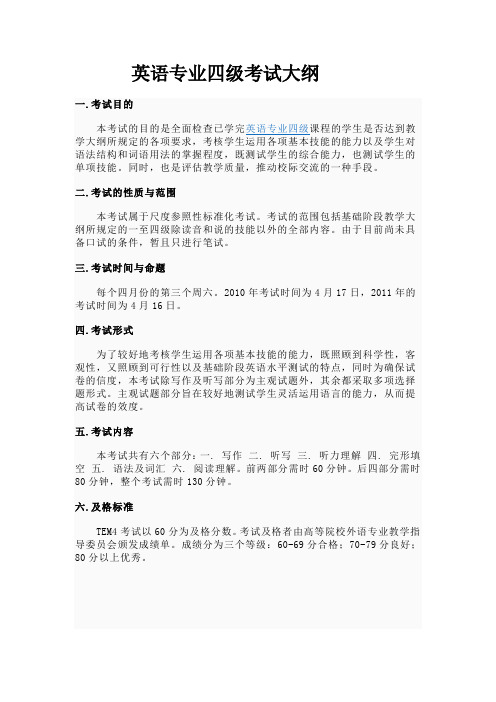
英语专业四级考试大纲
一.考试目的
本考试的目的是全面检查已学完英语专业四级课程的学生是否达到教学大纲所规定的各项要求,考核学生运用各项基本技能的能力以及学生对语法结构和词语用法的掌握程度,既测试学生的综合能力,也测试学生的单项技能。
同时,也是评估教学质量,推动校际交流的一种手段。
二.考试的性质与范围
本考试属于尺度参照性标准化考试。
考试的范围包括基础阶段教学大纲所规定的一至四级除读音和说的技能以外的全部内容。
由于目前尚未具备口试的条件,暂且只进行笔试。
三.考试时间与命题
每个四月份的第三个周六。
2010年考试时间为4月17日,2011年的考试时间为4月16日。
四.考试形式
为了较好地考核学生运用各项基本技能的能力,既照顾到科学性,客观性,又照顾到可行性以及基础阶段英语水平测试的特点,同时为确保试卷的信度,本考试除写作及听写部分为主观试题外,其余都采取多项选择题形式。
主观试题部分旨在较好地测试学生灵活运用语言的能力,从而提高试卷的效度。
五.考试内容
本考试共有六个部分:一. 写作二. 听写三. 听力理解四. 完形填空五. 语法及词汇六. 阅读理解。
前两部分需时60分钟。
后四部分需时80分钟,整个考试需时130分钟。
六.及格标准
TEM4考试以60分为及格分数。
考试及格者由高等院校外语专业教学指导委员会颁发成绩单。
成绩分为三个等级:60-69分合格;70-79分良好;80分以上优秀。
同等学力日语高频词汇总结与范例讲解(4)

同等学力日语高频词汇总结与范例讲解(4)掛ける日【かける】【kakeru】②【他动・二类】(1)挂上,悬挂;拉,挂(幕等)。
(つるす。
)看板を掛ける。
/把牌子挂在墙上。
(2)戴上;蒙上;盖上。
(かぶせる。
)めがねを掛ける。
/戴眼镜。
(3)搭上。
(もたせかける。
)はしごを壁に掛ける。
/把梯子搭在墙上。
(4)系上;捆上kunshang。
(結ぶ。
)たるになわを掛ける。
/用绳子捆上木桶。
(5)撩liao(水);浇jiao;泼po;倒,灌。
(浴びせる。
)背中に水を掛ける。
/往脊背上撩水。
(6)称cheng,衡量。
(目方をはかる。
)目方を掛ける。
/称分量。
(7)花费,花hua。
(費やす。
)費用を掛ける。
/花经费。
(8)坐(在……上);放(在……上)。
(上にのせる。
)腰を掛ける。
/坐下。
いすに掛ける。
/坐在椅子上。
(9)乘。
(かけ算をする。
)5に3を掛ける。
/五乘以三。
駆ける日【かける】【kakeru】②【自动・二类】(1)跑,快跑,奔跑。
(はやく走る。
疾走する。
)決勝点までまっしぐらに駆ける。
/一直向决胜点猛冲。
(2)(骑着马)跑,策马疾驰。
(馬に乗って走る。
)賭ける日【かける】【kakeru】(1)〔賭けごとをする〕打赌;赌输赢.金を賭ける/赌钱.マージャンに金を賭ける/打麻将赌钱.(2)〔危険をおかす〕拼(命),不惜(一切).命をかけて戦う/拼命奋战.加減日【かげん】【kagenn】◎【名·他动·三类】【接尾】(1)〈数〉加减;加法和减法。
(加えることと減らすこと。
)加減乗除。
/加减乘除。
(2)调整,调节(ほどよくする);斟酌(事情を考慮して);变换。
(形式・内容を変えて。
)速度を加減する。
/调整速度。
(3)程度;状态,情况。
(事物の具合。
)湯の加減。
/洗澡水的凉热程度。
過去日【かこ】【kako】①【名】(1)过去,既往。
(過ぎ去った時。
昔。
前歴。
)過去をしのぶ/回忆过去。
(2)前生,前世。
2023年英语专业四级听写50篇完整版

英语专业四级听写50篇前言听写在英语专业四级统考中占有15%的比重,是考试的重要组成部分。
说起听写,正在准备和已经参与过英语专业四级考试的同学会说:“我能明白听写的内容,可写的时候就是跟不上!”“短文大意我明白,可是有的语我不会写。
”这只反映出了问题的两个方面。
一是听写速度不够快。
二是词汇量不够或词汇掌握得不够准确。
这些无疑是影响听写成绩的重要因素。
但是,这些不是问题的所有。
在从事听写教学及听写问卷过程中,很容易发现学生失分的具体问题:(1)没听懂,没听好,听写速度跟不上,写出的内容断断续续不连贯,学生因此大量失分;(2)有的词汇没听懂,拼写不够准确,这导致听写失分;(3)时态错误导致失分;(4)单复数不准确导致失分;(5)没有注意断句或专有名词,句子开头单词或专有名词错误使用大小写导致失分;(6)没有注意原文冠词的使用,书写时漏掉冠词导致失分;(7)没有注意单数第三人称形式导致失分;(8)没有注意单数复数名词的形式导致失分。
上述问题的产生有的是缺少训练导致的,如书写速度跟不上。
有的则是语言基础较差导致的,如听力较差没有完全听懂或没有掌握好词汇。
而单复数、大小写、冠词漏写等则多是粗心大意导致的。
听写部分能提高吗?当然能!并且提高的空间很大。
笔者从事英语专业基础教学与研究,从一开始所带的教学班参与四级考试超过全国院校平均通过率28.2个百分点,超过全国专业外语院校平均通过率12.5个百分点开始,所带的教学班在全国英语专业④级统考中通过率始终ito%,平均成绩、优秀率始终名列前茅。
最近一次所带的教学班参与四级统考,又考出了很好的成绩,通过率超过全国院校平均水平26石个百分点,超过全国专业外语院校13.6个百分点,并且在十几个平行班中平均成绩是最高的,优秀人数也是最多的。
在四级考试中,听写一项的成绩也不例外,每次均位居第一,本项目满分15分,所带班级平均成绩可以达成14分。
是不是学生基础很好?登记表白,和平行班相比所带班级入学时并不存在什么特别优势。
英语专业四级教学大纲级考试大纲

英语专业四级教学大纲级考试大纲1.《教学大纲》对英语专业语法的总体描述是:能识别词类;区分名词的可数性和不可数性,可数名词的单、复数形式;基本掌握各种代词的形式与用法、基数词和序数词、常用介词和连词、形容词和副词的句法功能、比较级和最高级的构成及基本句型、冠词的一般用法;了解动词的主要种类、时态、语态及不定式和分词的基本用法、句子种类、基本句型和基本构词法。
掌握主谓一致关系、表语从句、宾语从句、定语从句和状语从句等句型、直接引语和间接引语的用法、动词不定式和分词的用法、各种时态、主动语态、被动语态和构词法。
其中对四级的要求是:除掌握上述内容外,还应该熟练掌握主语从句、同位语从句、倒装句和各种条件句。
2.《教学大纲》对英语专业词汇的总体描述是:认知词汇不少于2,000个;掌握1,200个左右的常用词和一定数量的习惯用语及固定搭配,并能在口语中运用;认识740个左右的单词和一定数量的习惯用语及固定搭配,能根据上下文的提示理解其含义。
通过基础英语课、阅读课和其他途径认知词汇达4,000~5,000个(其中含中学已学的2,000个),正确而熟练地使用其中的2,000~2,500个及其最基本的搭配。
其中对四级的要求是:通过基础英语课、阅读课和其他途径认知词汇5,500 6,500个(含第二级要求的4,000~5,000个),正确而熟练地运用其中的3,000~4,000个及其最基本的搭配。
近年来专业四级考试中Grammar and Vocabulary部分中,50%为词汇、词组和短语的用法,约50%为语法结构。
该题在总分中虽占分不多,但作为测试考生英语水平之基础,它对于TEM4中所有题项影响之大是众所周知的,因为任何一门外语的学习均始于词汇和语法,且对于词汇数量及其深度的掌握程度在一定意义上反应一个人的英语水平。
因此,掌握词汇和语法对于在TEM4中取得好成绩显得尤为重要。
综观这近几年考题,可发现:1.语法考题的涉及面宽,近年考题曾经考到:几乎所有词类;三种动词的非谓语形式;各种从句及关系词的用法;动词时态、虚拟语气、情态动词的用法;独立主格,主谓一致,倒装,强调、并列结构等基本语法知识。
MTI试题及参考答案
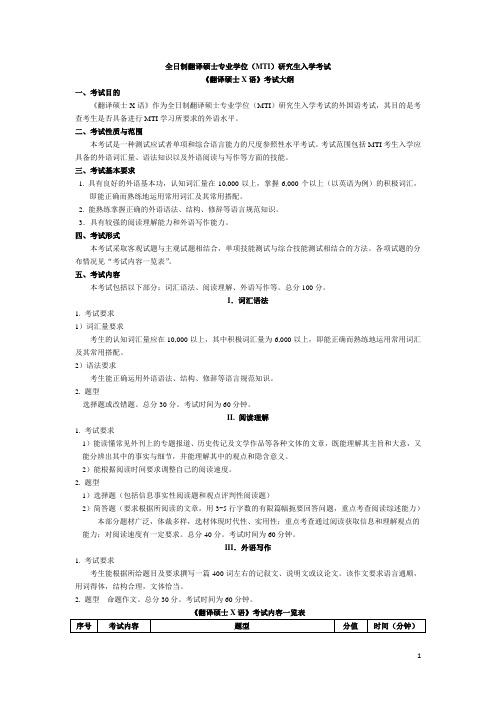
全日制翻译硕士专业学位(MTI)研究生入学考试《翻译硕士X语》考试大纲一、考试目的《翻译硕士X语》作为全日制翻译硕士专业学位(MTI)研究生入学考试的外国语考试,其目的是考查考生是否具备进行MTI学习所要求的外语水平。
二、考试性质与范围本考试是一种测试应试者单项和综合语言能力的尺度参照性水平考试。
考试范围包括MTI考生入学应具备的外语词汇量、语法知识以及外语阅读与写作等方面的技能。
三、考试基本要求1. 具有良好的外语基本功,认知词汇量在10,000以上,掌握6,000个以上(以英语为例)的积极词汇,即能正确而熟练地运用常用词汇及其常用搭配。
2. 能熟练掌握正确的外语语法、结构、修辞等语言规范知识。
3.具有较强的阅读理解能力和外语写作能力。
四、考试形式本考试采取客观试题与主观试题相结合,单项技能测试与综合技能测试相结合的方法。
各项试题的分布情况见“考试内容一览表”。
五、考试内容本考试包括以下部分:词汇语法、阅读理解、外语写作等。
总分100分。
I.词汇语法1. 考试要求1)词汇量要求考生的认知词汇量应在10,000以上,其中积极词汇量为6,000以上,即能正确而熟练地运用常用词汇及其常用搭配。
2)语法要求考生能正确运用外语语法、结构、修辞等语言规范知识。
2. 题型选择题或改错题。
总分30分。
考试时间为60分钟。
II. 阅读理解1. 考试要求1)能读懂常见外刊上的专题报道、历史传记及文学作品等各种文体的文章,既能理解其主旨和大意,又能分辨出其中的事实与细节,并能理解其中的观点和隐含意义。
2)能根据阅读时间要求调整自己的阅读速度。
2. 题型1)选择题(包括信息事实性阅读题和观点评判性阅读题)2)简答题(要求根据所阅读的文章,用3-5行字数的有限篇幅扼要回答问题,重点考查阅读综述能力)本部分题材广泛,体裁多样,选材体现时代性、实用性;重点考查通过阅读获取信息和理解观点的能力;对阅读速度有一定要求。
总分40分。
46英语(商务英语)专业《日语(二外)》
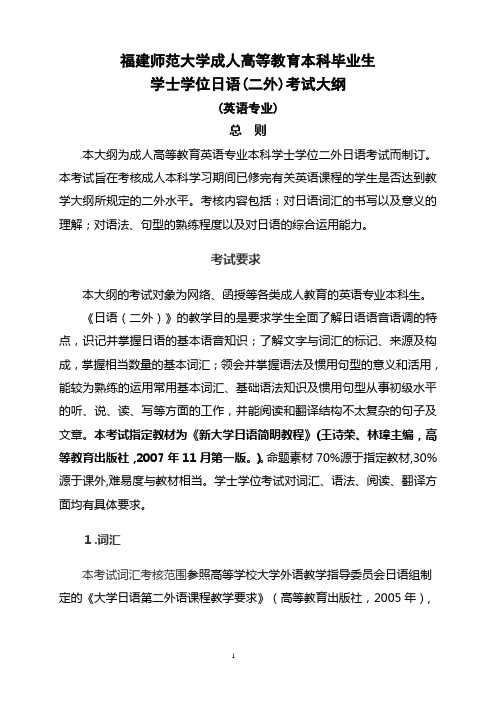
福建师范大学成人高等教育本科毕业生学士学位日语(二外)考试大纲(英语专业)总则本大纲为成人高等教育英语专业本科学士学位二外日语考试而制订。
本考试旨在考核成人本科学习期间已修完有关英语课程的学生是否达到教学大纲所规定的二外水平。
考核内容包括:对日语词汇的书写以及意义的理解;对语法、句型的熟练程度以及对日语的综合运用能力。
考试要求本大纲的考试对象为网络、函授等各类成人教育的英语专业本科生。
《日语(二外)》的教学目的是要求学生全面了解日语语音语调的特点,识记并掌握日语的基本语音知识;了解文字与词汇的标记、来源及构成,掌握相当数量的基本词汇;领会并掌握语法及惯用句型的意义和活用,能较为熟练的运用常用基本词汇、基础语法知识及惯用句型从事初级水平的听、说、读、写等方面的工作,并能阅读和翻译结构不太复杂的句子及文章。
本考试指定教材为《新大学日语简明教程》(王诗荣、林璋主编,高等教育出版社,2007年11月第一版。
)。
命题素材70%源于指定教材,30%源于课外,难易度与教材相当。
学士学位考试对词汇、语法、阅读、翻译方面均有具体要求。
1.词汇本考试词汇考核范围参照高等学校大学外语教学指导委员会日语组制定的《大学日语第二外语课程教学要求》(高等教育出版社,2005年),要求学生掌握约2000个单词,能够根据日语汉字选择其读音和根据读音选择其相对应的汉字。
2.语法要求考生能够较全面地了解和掌握日语的词法、句法的特征,在应用时能正确地用日语表达。
重点掌握用言和助动词的活用变化以及各类助词(特别是格助词、接续助词)的使用。
3.阅读能读懂与所学课文以及与课文难度相当的文章,并从中获取主要信息。
要求考生在充分理解短文内容的基础上进行正确答题。
4.翻译日译汉部分要求考生能不借助词典将课文中的段落以及难度相当于课文的短文翻译成汉语,理解正确,译文达意流畅。
汉译日部分要求考生能不借助词典将简单的日常汉语句子翻译成正确的日语。
考试说明本考试包括四个部分:词汇、语法、阅读、翻译。
新视线意大利语2单词全
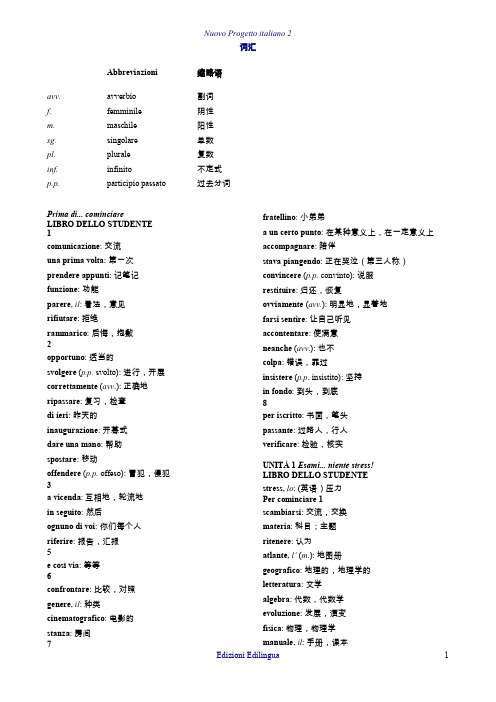
Abbreviazioni缩略语avv.avverbio副词f.femminile阴性m.maschile阳性sg.singolare单数pl.plurale复数inf.infinito不定式p.p.participio passato过去分词Prima di... cominciareLIBRO DELLO STUDENTE1comunicazione:交流una prima volta:第一次prendere appunti:记笔记funzione:功能parere,il:看法,意见rifiutare:拒绝rammarico:后悔,抱歉2opportuno:适当的svolgere(p.p.svolto):进行,开展correttamente(avv.):正确地ripassare:复习,检查di ieri:昨天的inaugurazione:开幕式dare una mano:帮助spostare:移动offendere(p.p.offeso):冒犯,侵犯3a vicenda:互相地,轮流地in seguito:然后ognuno di voi:你们每个人riferire:报告,汇报5e così via:等等6confrontare:比较,对照genere,il:种类cinematografico:电影的stanza:房间7fratellino:小弟弟a un certo punto:在某种意义上,在一定意义上accompagnare:陪伴stava piangendo:正在哭泣(第三人称)convincere(p.p.convinto):说服restituire:归还,恢复ovviamente(avv.):明显地,显著地farsi sentire:让自己听见accontentare:使满意neanche(avv.):也不colpa:错误,罪过insistere(p.p. insistito):坚持in fondo:到头,到底8per iscritto:书面,笔头passante:过路人,行人verificare:检验,核实UNITÀ 1Esami... niente stress!LIBRO DELLO STUDENTEstress,lo: (英语)压力Per cominciare 1scambiarsi:交流,交换materia:科目;主题ritenere:认为atlante,l’(m.):地图册geografico:地理的,地理学的letteratura:文学algebra:代数,代数学evoluzione:发展,演变fisica:物理,物理学manuale,il:手册,课本Per cominciare 3gridare:呼喊,叫嚷servire:为……服务,有用于magari(avv.):甚至,可能prestare:借,借出sfogliare:翻阅,浏览fotocopiare:复印In questa unità...incredulità:怀疑,不相信rassicurare:使放心complimentarsi:恭喜,祝贺pronomi combinati:组合代词interrogativi:疑问,问题A1che c’è?:怎么了?superare:超越,克服Caspita!:哎呀!天哪! (表示惊奇或不耐烦)assolutamente(avv.):绝对地,完全地non ci credo:我不相信(不肯定)solo che arrivi tardi:要是不及时到达Accidenti!:天哪!come faccio?:我该怎么办?grazie lo stesso:同样感谢la parte sul Romanticismo:浪漫主义的部分Romanticismo:浪漫主义trentina:三十几个mi raccomando:我求你,拜托了giusto il tempo di:恰好是……的时间fotocopiarle:把它们复印dare indietro:退回,退还A2rivolgersi(p.p.rivolto):转向某人说话,面对某人risolversi(p.p.risolto):结果为A3contrarietà:反对A4accontentarsi (di):对……感到满意anzi:反而,甚至copia:副本,复印件pubblicare:出版,公开A6riferirsi (a):与……有关A7trasformarsi:变化,变形rivedere(p.p.riveduto/rivisto):再看;复习;检查consultare:请教,参考aggiunta:增加,添加esso: (阳性)它B2comportamento:行为,表现Si figuri!:瞧(您)说的!哪儿的话!B3calpestare:踩,踏distratto(inf. distrarre):心不在焉的,粗心的addosso(avv.):在肩上;在身上;负担B4sostiene l’esame:经受考验(考试)sostenere:经受;维持dunque:因此,那么,总之poeti minori:小(酸腐)诗人minore:较小的capitolo:章节andare avanti:前进informato:多知多闻的,消息灵通的mandare via:驱逐,赶走frequentare:上(学),听(课)tentare (di):试图(做……)copiare:抄写;抄袭B6cornice,la:镜框,框架tempo fa:早前,一段时间以前parecchio:一些,几个precedere:先于……,在……之前fare parte (di):成为……的一部分B7permesso:允许,许可C1dove cavolo... ?: (俚语) ……到底在哪儿?cavolo:卷心菜mettersi (con):站在(某人)一边ha vinto al totocalcio:中了足球彩票fare visita:看望;参观ex:前任fidanzarsi:订婚tanto ormai non me ne frega più niente!:反正我一点也不在乎了!fregarsene: (口语)在意,在乎C3reagire:反抗,起反应riportare:传述;报告conoscente:熟人annullare:取消,撤消torinese:都灵的in vista:鉴于;关注a rischio:冒……的危险D1tipo:家伙D2dipendere (da)(p.p.dipeso):取决于D3significativo:有意义的D4esami di maturità:高中毕业考试maturità:高中毕业文凭;成熟,壮年coincidere(p.p.coinciso):同时发生,协调一致tesina:论文补充答辩commovente:动人的,感人的incubo:恶梦,精神压力per quanto riguarda:至于,关于riguardare:再看,视为preparazione:准备,筹备terribile:可怕的;严格的;强烈的consegnare:交付,委托compito:任务,作业in bianco:空白的inutile:没用的incorniciare:给……上框foglietto:小叶片regalo di nozze:结婚礼物nozze:婚礼distaccato:分离的,孤立的rispetto ai miei compagni:尊重(珍惜)我的伙伴们in pratica:事实上,其实limitarsi (a):仅限于rendersi conto (di):体会到,懂了,了解terrorismo:恐怖主义nell’aria:在空气中,在空中terrorizzato(inf.terrorizzare):胁迫,恐吓portafortuna,il:吉祥物,护身符D6di nascosto:偷偷地,暗地里E1dipartimento: (大学的)系,部门frequenza:频繁,频度prova:试验,考试esami di ammissione:入学考试ammissione:接纳,录用facoltà:院,系obbligatorio:必须履行的,义务的ingresso:入口sono previsti:在预料之内italianistica:意大利语言文学,意大利学comprendere(preso):包括;理解E2odontoiatria:牙科ingegneria:工程;工程学giurisprudenza:法学,法理学chirurgo:外科医生E4organizzazione:组织materiale,il:材料informativo:报告消息的,提供资料的poiché:由于,因为considerare:认为,视为;考虑,思考una delle migliori:最好的之一non ne vuole sapere: (他/她)一点都不想知道distanza:距离mettere a rischio:置于……风险之中relazione:关系,联系,交往E5intenzione:意图,打算studentesco: (大、中)学校学生的Conosciamo l’italiaLa scuola...asilo nido:托儿所asilo:庇护所nido:穴,巢,窝scuola materna:幼儿园materno:母亲的,母方的scuola dell’obbligo:义务学校obbligo:义务,职责scuola elementare:小学apprendere(p.p.appreso):学习,了解,知道nozione:概念,观念cultura generale:文化概况cultura:文化guaio:不幸,困境;麻烦scuola media:初中alunno:中、小学生ottenere:获得licenza media:中学毕业考试licenza:中学毕业(文凭)scuola media superiore:高中superiore:较高的,高等的scientifico:科学的linguistico:语言的istituto:学院,专科大学tecnico:技术的,技能的professionale:职业的,专业的durata:期间;持续,持久totalità:全体,全部diploma di maturità,il:高中毕业证书diploma,il:毕业文凭,学位证书videolezione:视听课程rendere(p.p.reso):使得,使变为maturo:高中毕业考试及格的;成熟的...e l’università italianain possesso di diploma:拥有高中毕业证书possesso:占有,拥有;支配,掌握di loro scelta:他们选择的a numero chiuso:限额superamento:越过,超出;克服accesso:进入studio:学习universitario:大学的sovraffollato:挤满的,塞满的percentuale:百分比的cosiddetto:所谓的,称号的fuori corso:学习期满但尚未取得学位的大学生tesi di laurea,la:毕业论文tesi,la:论文;论题,论点d’altra parte:此外,另外nonostante:虽然,尽管staccato(inf. staccare):分开的;取下的;撕下的mondo del lavoro:工作领域occupazione:职业;就业variare:变化;使有变化a seconda della facoltà:按照院系tuttavia:但是,可是,然而laurea breve:短期毕业specifico:特殊的area:领域,范围,区corsi di specializzazione:专门(专业)课程dottorati di ricerca:博士研究生ricerca:寻找;探索,研究statale:国家的,国立的accademico:学院的;学术的politecnico:综合工科大学ateneo:大学,高等院校inferiore:下面的;低级的carente:缺少……的;不足的,不完全的tradursi(p.p.tradotto):自述,自译perdita di tempo:浪费时间vantaggio:优势,好处svantaggio:不利,劣势,害处avere sede: (地址)处于,位于sede,la:住所,场地maestoso:雄伟的,壮丽的,庄严的Glossariodiscutere(p.p.discusso):讨论esame di laurea:毕业考试ulteriore:进一步的,以后的;较远的ambito:界限,范围Autovalutazioneriportare:带回,归还che classe fai?:你读什么班?Appendice grammaticaleallegro:快乐的raccontare:叙述il perché:原因Materiale per le situazioni comunicative Aintensivo:紧张的;强化的alloggio:住宿escursione,l’(f.):远足Bsuper-intensivo:超级紧张的;超强化的supplementare:补充的a persona:个人,每人stanza singola:单人间stanza doppia:双人间cucina:厨房,烹饪nei dintorni di Firenze:在佛罗伦萨郊区dintorni:郊区QUADERNO DEGLI ESERCIZI1batteria:电池scarico:空的4giocattolo:玩具5succo di frutta:鲜榨水果汁dietetico:饮食的6rubare:偷,盗窃fogli,i(sg.il foglio):纸7onomastico:命名日fatto:事情8lavanderia:洗衣房nel pomeriggio:在下午atteggiamento:态度9medicina:内服药farmacista:药剂师10convalidare:使生效,确认11collezionare:收集,收藏accaduto:发生的事情macchina fotografica:照相机fotografico:摄影的,照相的13permettersi(p.p.permesso):允许自己essere contrari a...:反对arrestare:逮捕,拘留si tratta certamente di un errore:这肯定是一个错误assumere(p.p.assunto):聘用in un gran supermercato:在一个大超市里14hai appreso la notizia?:你知道这个消息吗? 16mestiere,il:职业,工作17importare:进口distare:距,有……的距离18a buon mercato:便宜的fabbrica:工厂19condurre(p.p.condotto):进行,开展milionario:百万富翁residenziale:住宅的smetterla (di)(p.p.smesso):您停止20derivare:源于formulare:照格式写ciascuno:每人21autista:司机,驾驶员22sociologo:社会学家abbandono:抛弃scolastico:学校的dispersione:分散adolescente:青少年alla base di...:基于mancanza:缺乏educativo:有教养的annoiare:使烦恼media,i(sg. il medium):媒体rendimento:效率disagio:不自在,拘束Test finaleAdesinenza:词尾collana:项链crociera:游海magnifico:壮丽的;华丽的;杰出的;极好的meraviglioso:极好的Bfinanza:财政学vivace:活泼的un sacco di...:一袋……;一包……Ccortese:有礼貌的convincente:有说服力的diplomarsi:毕业specializzarsi:专门化,专业化Dspaventoso:吓人的,恐怖的vi mangiano:在那里吃UNITÀ 2Soldi e lavoroLIBRO DELLO STUDENTEPer cominciare 1sportello bancomat:银行自动取款机sportello: (售票、服务等)窗口bancomat:银行借记卡assegno:支票Per cominciare 2risparmiare:节省Per cominciare 3conto corrente,il:活期账户fare la fila:排队In questa unità...formulare:提出,表明curriculum vitae,il:简历,履历pronomi relativi:关系代词costrutto:句法关系gerundio:副动词A1almeno(avv.):至少sicuro:安全的,确信的bancario:银行的pensato apposta per gli studenti:特意为学生考虑到apposta(avv.):特意地tipo:种类,类型prima di tutto:首先evitare:避免,禁止operazione:操作per telefono:用电话,通过电话via internet:通过因特网spiritoso:幽默的,生动的al contrario:相反maniera:方式,态度,手法conto in rosso:可透支账户A3impiegata di banca:银行女职员tasso d’interesse:利息率tasso:率,比率interesse,l’(m.):利息;利益,好处secondo:第二prelevare:提取,抽取automatico:自动的appunto(avv.):正是;确实如此funziona anche come carta di credito:也作信用卡使用acquisto:购买;获得A5indeclinabile:无性数变化的equivoco:歧义;误会A6trattoria:餐馆A7serio:严肃的,严重的A8è sempre preceduto da...:总是在……之后accompagnato da...:在……的陪伴下,伴以……A9in base a...:基于……avere fiducia (in):信任(某人)caotico:混乱的,无序的B1in disordine:混乱的,杂乱的disordine,il:混乱,杂乱per curiosità:出于好奇curiosità:好奇心mutuo:借,抵押altrimenti(avv.):不同地;反之,否则al verde:身无分文il fatto è che...:事实是……B2rivolgere una domanda:反复考虑一个问题rivolgere(p.p.rivolto):盘算,反复思考B3lasciarsi (con):与……分开,与……分手Cegregio:杰出的;(书信中)尊敬的C2spettabile: (商业信函中)尊敬的(公司、企业等) cortese:彬彬有礼的,谦恭的in risposta all’annuncio:恢复通知apparire(p.p.apparso):出现,显现desiderare:希望;祝愿sottoporre (a)(p.p.sottoposto):提交,提请candidatura:候选人身份,候选人资格allegare:附带,附加maturare:使成熟didattica:教学法的,教学的adolescente:青少年esigenza:要求,苛求prestigioso:有威信的,有声望的,受尊敬的in attesa di...:等候,等待resto a Sua disposizione:我听您吩咐(支配) eventuale:可能发生的,偶然的colloquio:谈话,会谈;面试distinti saluti: (信函结尾)致以问候distinto:有区别的;著名的,杰出的redazione:编辑;编辑部attualmente(avv.):目前,当前fare riferimento:提及riferimento:涉及;参照personalmente(avv.):亲自;就个人而言C3essa: (阴性)它C4tocca a voi:轮到你们了azienda:企业lettera di presentazione:推荐信,介绍信campo:领域;田地operare:工作,活动;进行,实行posto:位置,地位editoria:出版业arredamento:室内布置,装饰ricoprire(p.p.ricoperto):盖住,覆盖;担任responsabile vendite:销售人员,经销商formula:惯用语;套式,程式apertura:开头,开篇chiusura:结尾,末尾ditta:商号,公司porgere(p.p.porto):表示,致以cordiale:由衷的,发自内心的cordialmente(avv.):热烈地,亲切地stima:尊重,敬重fede,la:信任,忠实C5proverbio:谚语C6da sè:自己,单独pigliare:抓,拿sano:健康的alloggiare:提供住宿,留宿tesoro:宝藏,宝贝Din bocca al lupo!:祝你成功!(考试、狩猎等之前祝贺用语)D1candidato:候选人,应考者concorso:竞赛,竞争deluso:失望的,失落的D2ciascuno:每个的nel senso che...:意思是……,就是说……fare la domanda:提问题mesi e mesi:一连几个月il che:这个,这一点(指代上文提到的事)incoraggiante:令人振奋的,鼓舞人心的concorso pubblico:公开比赛in che senso... ?: ……是什么意思?Crepi!:但愿如此! (专门用以回答“In bocca al lupo!”) crepare:破裂,裂开D3coloro:颜色E1colloquio di lavoro:应聘面试,招工面试frequente:频繁的,经常的E3nascita:出生;出身stato civile:婚姻状况stato:状况,状态civile:市民的,公民的;世俗的celibe:独身的,未婚的istruzione:教育,教导titoli di studio:学位voto:分数votazione:分,分数informatico:信息学的sistema operativo:操作系统operativo:实用的,操作的lavorativo:工作的E5abbigliamento:服装ricercare:寻找addetto alle vendite:销售员addetto:雇员,职员pacchetti informatici:计算机信息包preferibilmente(avv.):更可取地,更好地affidabilità:可信度precisione:确切,正确,精确costituire:建造,创造periodo di prova:试用期assunzione:雇佣;承担a tempo indeterminato:不定时的indeterminato:未确定的,不明确的via fax:通过传真assicurazioni:保险neolaureato:新毕业的大学生inserire:插入,加上responsabile commerciale:商务代表、负责人requisito:要求,必要条件età inferiore ai 29 anni:年龄29岁以下programmi informatici:计算机程序preferenziale:优先的,优惠的studi legali:律师事务所legale:法律的corsi specialistici:专业课程specialistico:专业的,专门的finanziario:财政的,金融的tramite:通过aziendale:企业的,单位的sezione:处,科;分部opportunità:适宜;时机compagnia:公司Fin diretta:现场直播的diretta:直接的F2imbarazzante:使人为难的,令人尴尬的scambiare:弄错,搞错;交换,调换ospite:客人,宾客cardinale,il:红衣主教Papa,il:罗马教皇accorgersi (di)(p.p.accorto):注意到originario:最初的,原始的;出生于当地的epocale:时代的,时期的è finito:完了,毫无办法telecamera:电视摄像机mondiale:世界的,世界范围的proporsi come tecnico:自荐为技术员proporsi(p.p.proposto):自我推荐tecnico:技术员all’improvviso:突然stavo per allontanarmi:我正要离开allontanarsi:离开,远离reception,la:招待会quando un tipo:这时有个家伙……seguire:跟随,跟着di fretta:匆忙地,赶忙per stargli dietro:为了跟住他correndo correndo:跑啊跑啊,跑着跑着camerino:小屋,化妆室truccatore:化妆师al trucco: (在)化装,化妆trucco:化装,化妆dritto nello studio:直接到演播室conduttrice:女主持人incertezza:犹豫不决,不确定stare calmo:沉住气calmo:平静的;镇静的licenziare:解雇assumere(p.p.assunto):雇佣azzeccare: (把仪器)归零lì per lì:一时,霎时间nel frattempo:与此同时lobby,la:休息室,大厅monitor,il:监视器,监控器comparire(parso):出现,显露schermo:银幕,屏幕volto:脸;外表sconosciuto:不知名的,陌生的coerente:连贯的,有条理的intervistatrice:女采访记者l’equivoco si è sciolto:误会解除了sciogliersi(p.p.sciolto):解除;融化accogliere(p.p.accolto):欢迎,接待;容纳recarsi:去,前往disoccupato:失业者licenziamento:解雇in modo generico:以普通方式generico:一般的,普通的venire fuori: (说、做)出来incoerente:不连贯的,无条理的F3evidenziare:专门列出,特别表明aspetto:方面;外观progressivo:渐进的,逐渐的prossimità:靠近,临近,接近F4fare quattro passi:走走,散步F5storiella:小故事G1definizione:定义,解说tratte da un dizionario:从字典中找出commercialista:经济贸易学家elettricista:电工cuoco:厨师operaio:工人riparare:保护,避难installare:安置,安装impianto:装置,设备elettrico:电的,带电的mestiere,il:手艺,职业scuola d’infanzia:幼儿园infanzia:童年,幼年期professionista:从事某一职业者amministrativo:行政的,管理的serve a tavola:餐厅服务servire:为……服务provvedere (a):提供,供给;采取措施pulizie:打扫卫生,扫除lavoratore:工作者dipendente:从属的;职员manuale:手工的,手做的faticoso:使疲劳的,费力的arte del cucinare:厨艺sbrigare:应对,处理corrispondenza:来往信函G3fissare:预约;确定,决定chiarimento:解释,说明G4condizione:条件,待遇ambiente,l’(m.):环境in alternativa:轮流地,交替地Conosciamo l’italiaL’economia italianaIl miracolo italianomiracolo:奇迹economia basata:基础经济sull’agricoltura:关于农业方面agricoltura:农业,农学materie prime:原料piano:计划finanziamento:投资,提供资金sostegno:支撑,支柱;依靠ripresa economica:经济复苏mettere in ginocchio:跪下,下跪;陷入危机realizzare:实现opere pubbliche:公共事业autostrada:高速公路consumo:使用,消耗,耗费rinnovare:更新manodopera:劳动力;人工成本essere in grado (di):有……能力,能够……esportare:出口,输出frigorifero:电冰箱lavatrice,la:洗衣机tessile:纺织的,织物的settore:领域,部门metalmeccanico:冶金机械的petrolchimico:石油化学的senza precedenti:史无先例的,空前的“boom” economico:经济景气accentuare:强调,加剧squilibrio:不平衡decine di migliaia:数以万计的decina:十个左右migliaia,le(sg. il migliaio):一千个左右emigrare:移居他乡,移民industriale:工业的cassa:银行,基金会Mezzogiorno:意大利南方istituire:建立,设立favorire:促进,有利于L’economia oggiuno dei paesi più sviluppati al mondo:世界发达国家之一creatività:创造性,创造力affermarsi:成名;流行macchinario:机器,机械motocicletta:摩托车elettrodomestico:家用电器design,il: (工业)设计pneumatico:轮胎salumi,i(sg. il salume):猪肉食品capo:件数calzature: (总称)鞋accessorio:附件,配饰di alta qualità:优质的servizi:服务occupare:占,占有popolazione:人口,人民tra l’altro:再说,此外telecomunicazione:远距离通信,电信elemento:要素,组成部分quest’ultima:后者(指最后提到的人、物)di proprietà:属于……私有的Belpaese,il:美丽国度(特指意大利)ammirare:欣赏tesori d’arte:艺术珍宝bellezze naturali:美丽的自然景色fiera:集市,商品展览会colosso:巨人appartenere:归属,归……所有trasformazione:改变segnale,il:信号,标记verificarsi:被证实,得到证明risorse naturali:自然资源risorsa:资源a livello europeo:按欧洲标准的,欧洲水平的costoso:贵的,昂贵的marchio:腐烂的,腐朽的portale,il:正门,大门;门户网站promuovere(p.p.promosso):促进,提升lasciare il segno:留下痕迹,留下记号segno:痕迹,标记,符号forte presenza:完美的形象presenza:外表,形象segreto:秘密Glossariosostanza:实体,物质petrolio:石油ferro:铁legno:木头,木料edificio:建筑物,大厦funzionamento:行使职责;活动,运转industria:工业,产业umano:人类的,人的stoffa:织物,织品,布料mettere in evidenza:明确指出,强调指出evidenza:明显,显著fondare:建立gomma:橡胶,橡皮veicolo:车辆,运输工具settore terziario:第三产业,服务业esposizione:展览,陈列salone,il:展览会mostra-mercato,la:展销会Autovalutazionenon vedere tutto nero:不要太悲观decennio:十年versare:投资,注资mettere soldi da parte:存钱,攒钱mole,la:庞大的建筑物Appendice grammaticalefacoltativo:可任意选择的legato(inf. legare):联结的complemento di specificazione:补充阐明concordare:一致ammettere(p.p.ammesso):接纳,允许,承认oltre il termine previsto:超出预先目的oltre:多于……termine,il:目的elenco:一览表valere(p.p.valso):价值affrettarsi (a):赶快compiere:完成avvertire:通知,警告Materiale per le situazioni comunicativeAmaster,il:硕士tecnologia:技术ottimo:最好的tirocinio:培训,实习membro:成员staff,lo: (全体)工作人员studi di registrazioni:录音棚registrazione,la:录音audio-visivo:视听的traccia:要点;踪迹,痕迹trattamento economico:经济待遇trattamento:待遇Bessere disposto (a):准备好……QUADERNO DEGLI ESERCIZI1operare:做手术sopportare:容忍storico:历史学家parlare male:讲坏话2cittadino:城市的3sa il fatto suo:精通本职工作non prende mai le cose sul serio:从未认真地对待事情4fidarsi (di):信任(某人)5contare (su):依靠(某人)6sporco:脏的7parrucchiera:女理发师8scadere:到期maggiormente(avv.):较大地;较多地aprirsi(p.p.aperto):推心置腹9gioventù,la:青少年时期pesciolino:小鱼ereditare:继承10affidare (a):委托11dipendente:职员idratante:水合的effetto:结果miracoloso:神奇的vantaggioso:合算的12beato:有福的13alla rinfusa:杂乱无章的colui:那个人colei:她non guasta:不影响guastare:影响borsa di studio:奖学金gadget,il:小玩意14scoppiare una guerra:爆发一场战争orribile:可怕的in tempo:及时17corrispondente:相应的noioso:令人厌烦的,乏味的18pallacanestro,la:篮球19in riferimento a...:关于……a pieni voti:满分conseguire:获得management,il:管理precedentemente(avv.):在前地,在先地perfezionare:使完善competenza:能力scrittura:书写grafica:书画刻印艺术impiego:职业,职务estero:对外的elettronica:电子学tuttora(avv.):仍然,还prospettive:前景,前途ambizione:志向responsabilità:责任;职责,职务all’interno di...:在……内部struttura:组织,机构professionalità:专业riscontro:回信gentilezza:有礼貌的言行teorico:理论的20vicedirettore:副主任,副经理includere(p.p.incluso):包括,包含borsa:金钱prepagare:预付Test finale Amammone,il:总缠着妈妈的小孩precario:不固定的stage,lo:舞台dedicarsi:致力于,专心于a tempo pieno:全天地con il risultato che...:结果是per necessità:为了必需品Bignorante:无知的人Cautomobilistico:汽车工业的destino:目的地Dfortemente(avv.):极其,非常potere,il:权利ruota:车轮motore:发动机notevole:显著的extraurbano:位于外城的a pagamento:要付钱的vietare:禁止pedone:行人distribuzione:销售,发行interpretazione:解释UNITÀ 3In viaggio per l’Italia LIBRO DELLO STUDENTEin viaggio per l’italia:走遍意大利Per cominciare 1località:地方,场所viaggio di nozze:蜜月旅行culturale:文化的,修养的Per cominciare 4stipendio:薪水,工资altissimo:极高的,很高的spostamento:移动,调动,转移In questa unitàparagone,il:比较,对比dare giudizi:做出判断,做出评价giudizio:判断,评判turistico:旅行的lessico:词汇relativo a...:与……有关alberghiero:旅馆的comparazione:比较,对照grado:程度,水平,等级farcela:办到,办成andarsene:离开,走掉A1numerare:给……编号,计数vivace:活泼的,热烈的fare a meno (di):缺少……;放弃……già:当然;是吗meno(avv.):较少地,更少地non ti resta che Firenze:你只应该去佛罗伦萨impersonale:一般的,无特点的dai:快点,快città d’arte:艺术之城se la pensi così:如果你这么看它rinunciare (a):放弃,抛弃casa, dolce casa:家,温馨的家quanto:与……一样spostarsi:移动,转移vaporetto:汽船,汽艇il massimo:最大量,最大限度ospitale:好客的frenetico:疯狂的,狂热的per di più:此外,更加fa un freddo cane:冷得可怕catena:连锁店A2intendere(p.p.inteso):听见sopportabile:可忍受的,可承受的sopportare:忍受,承受punto di vista:观点alternativa:取舍,抉择A3indeciso:未定的,不明确的vivo:有活力的,活泼的prendere in considerazione:考虑,研究considerazione:考虑,思考rischiare (di):冒着……的危险A4declinarsi: (语法)性数变化A6confronto:比较,对照comparativo:比较级di maggioranza:较大程度的maggioranza:较大程度minoranza:较小程度uguaglianza:同等程度A7magro:瘦的comodo:舒适的,方便的A8osservazione:评论,意见abitante:居民,人口esattezza:准确,精细superficie,la(pl.le superfici):面积Btorinese:都灵人B1mentalità:思想,精神B2metà:一半viceversa(avv.):相反,反之sindaco:市长sono pazzo di Agrigento:我对阿格里琴托(西西里城市)着迷pazzo:疯子costiera:海岸,沿海地区adorare:崇拜,喜爱meridionale:南方的settentrionale:北方的di origini calabresi:原籍是卡拉普里亚的calabrese:卡拉普里亚区的piemontese:皮埃蒙特区的;皮埃蒙特人sangue,il:血液,血统siciliano:西西里人;西西里的ho parenti sparsi lungo tutta la penisola:我在整个(意大利)半岛都有亲戚spargere(p.p.sparso):分散,撒落,布满lungo(prep.):沿着scrittrice:女作家è una parte di me:是我的一部分spirito:精神,心灵emozione:兴奋,激动affascinare:吸引,引人入胜fermo:静止的,不动的guidare:引导;驾驶semaforo:信号灯privacy,la: (英语)私生活,隐私garantire:担保,保证,确保chiunque:不论谁,任何人a ogni ora:在每个小时insomma(avv.):总之,总而言之terribilmente(avv.):恐怖地veneziano:威尼斯的;威尼斯人si lascia guidare:他使自己受……支配 (由……引导) godere (di):享受B4furbo:狡猾的,机智的recitare:朗诵,背诵verdura:蔬菜B5chef: (法语)厨师长attraente:有吸引力的,有魅力的B6riquadro:方形,方块sardo:撒丁岛的;撒丁岛人,撒丁岛方言palermitano:巴勒莫的;巴勒莫人,巴勒莫方言milanese:米兰的;米兰人,米兰方言lombardo:伦巴第区的;伦巴第人,伦巴第方言emiliano:艾米利亚区的;艾米利亚人molisano:莫利塞区的;莫利塞人C1criterio:标准,准则C2immerso nel verde:陷入贫困中immergere(p.p.immerso):浸入,陷入immenso:广大的,辽阔的campeggio:野营,露营parcheggio:停车处,停车场C3menzionare:提及,说起satellitare:卫星的,人造卫星的mini bar,il:迷你酒吧frigobar,il:冷柜式酒吧aria condizionata:空调设备,冷气设备C4matrimoniale:婚姻的,结婚的con vista sul parco:能看到公园风景的chiede indicazioni su come arrivare:询问如何到达C5quanto possibile:尽可能C6raggiungere(p.p.raggiunto):抵达,到达esclusivo:排外的;专有的auditorium,l’(m.):礼堂,音乐厅attrattiva:吸引力,魅力,诱惑力situare:放置,安放residenziale:住宅的atmosfera:大气;气氛rilassante:放松的,缓和的spuntino:小吃,快餐sala riunioni:会议厅riunione:会议,聚会capienza:容纳量,吸收力Grande Raccordo Anulare:罗马环形公路raccordo:连接处anulare:环行的proseguire:继续;继续进行ristrutturare:重组,改建rapido:快的collegamento:联系,连接punti di interesse:兴趣点prima colazione a buffet:自助式早餐prima colazione:早餐buffet,il:自助餐,冷餐会torte fatte in casa:家庭制作的蛋糕gratuitamente(avv.):免费地su richiesta:要求,需求garage,il: (法语)汽车库Rete,la:网络doccia:淋浴,淋浴器idromassaggio:水流按摩con sauna convenzionata:带有指定的桑拿sauna:桑拿convenzionare:商定,协定C7pernottare:在外过夜D1prezioso:珍贵的,贵重的superlativo relativo:相对最高级D3fumetto:连环画D4superlativo assoluto:绝对最高级D5signoria:统治,管辖grandezza:大小,尺寸monumentale:纪念碑的,多古迹的;纪念性的nettuno:海王星;海神capolavoro:杰作raccolta:集,汇集straordinario:非凡的,不寻常的cittadino:公民,市民incantare:使着魔,使入迷fiorentino:佛罗伦萨的;佛罗伦萨人,佛罗伦萨方言salvare:挽救,拯救medievale:中世纪的stradina:小道,小街bottega:店铺,小手工业作坊artigiano:手艺人,工匠;手工业的aperte sulla via:在街道上开设malinconia:忧郁,伤感ovunque(avv.):无论何处scoprire(p.p.scoperto):发现,认出tetto:房顶,屋顶antenna:天线D6paragrafo:段落D7cattivo:坏的peggiore:更差的,更糟的guadagno:挣钱,收入più alti del previsto:比预料的要高aspettativa:等待,预料,期望D8misura:测量,尺寸,计量单位polizia stradale:交通警察responsabilità:责任E2soggiorno:逗留,停留;起居室pernottamento:在外面过夜ricevimento:接受,接待volo:航班bagaglio:行李guida:向导,导游meta:目的地,终点E5invitante:邀请者brochure,la:小册子,手册deludente:令人失望的,令人沮丧的esporre(p.p.esposto):说明,解释;展出,陈列affrontare:面临;应付ospitalità:接待,款待professionalità:职业特性,专业技巧personale,il:人员Conosciamo l’italiaRomaeterno:不朽的,永恒的impero:帝国antichità:古老,古代estendersi(p.p.esteso):扩大,延伸,蔓延riva:岸,滨fiume,il:河tevere,il:台伯河contare:计算;有splendido:辉煌的;杰出的metropoli,la:大城市,大都会ore di punta:高峰时间ordinario:普通的,平常的innumerevole:无数的,数不清的meritare:值得foro:广场,市场religioso:宗教的politico:政治的vi si trovano:那里坐落着rovine:废墟templi,i(sg. il tempio):庙宇palazzo:宫殿;楼房epoca:纪元,时代anfiteatro: (古罗马的)圆形露天剧场isola pedonale:行人安全岛pedonale:行人的punti di ritrovo:聚会地点piacevole:愉快的,令人高兴的animare:赋予生命,使有生气frequentatissimo:人们经常光顾的deve il suo nome a...:由……而得名ambasciata:大使馆enorme:巨大的,庞大的scalinata:大台阶trinità: (圣父、圣子、圣灵)三位一体monte,il:山,山峰grandioso:宏伟的,壮丽的gettare:投,抛moneta:货币;硬币fare ritorno:回到,返回basilica:长方形教堂,大教堂circondare:围绕,围住portico:拱廊,柱廊pietà:怜悯,同情cappella:小教堂,祭台indipendente:独立的,自主的catacomba:地下巢穴,坟墓terme:温泉浴室,古罗马公共浴场Glossariogovernare:统制,管理imperatore:皇帝pratiche religiose:宗教仪式,宗教活动riservare:保留,保存tutt’intorno:周围一切impressionare:给人以深刻印象sotterraneo:地下的;秘密的cristiano:基督教的;基督教教徒cimitero:墓地,公墓pregare:请求,恳求;向……祷告disporre (di)(p.p.disposto):拥有,支配Milano e Bolognafertile:肥沃的,富饶的Borsa Valori:证券交易所efficiente:高效率的,有能力的inevitabile:不可避免的trasferirsi:搬家,迁徙urbano:城市的,都市的rappresentativo:代表性的,典型的senz’altro:当然,无疑gotico:歌特人;歌特式的cattedrale,la:主教教堂,大教堂celebre:著名的,驰名的lirico:抒情的un tempo:曾经,一度residenza:寓所,住宅duchi,i(sg. il duca):公爵dal vivo:亲历,在现场Cenacolo:《最后的晚餐》convento:修道院naviglio:可航行的运河gastronomico:烹调法的,美食学的rinomato:有名的,闻名的varietà:多样,变化,不同torre,la:塔,塔状建筑物pendente:倾斜的andare a spasso:去散步,去遛弯Glossariocolonnato:柱廊;有柱子的andare in scena:上演,演出Venezia e Napolicanale,il:运河,水渠suggestivo:动人的,迷人的sospiro:叹气,叹息condannato:被判刑的;被判刑的人sospirare:叹气sott’acqua:水下的affondare:面对lentamente(avv.):缓慢地centimetro:厘米meraviglioso:惊人的,绝妙的,精彩的sorgere(p.p.sorto):树立,升起veneto:威尼托的;威尼托人bizantino:拜占庭的intervento:介入,干涉traccia:足迹,踪迹romanico:罗马式的,罗马风格的rinascimentale:文艺复兴时期的,文艺复兴风格的ducale:公爵的gloria:光荣,荣誉doge,il: (威尼斯共和国和热那亚共和国的)执政官Repubblica marinara:海上共和国morire(p.p.morto):死,死亡golfo:海湾ai piedi:在……脚下vulcano:火山regno:王国glorioso:光荣的,荣誉的testimonianza:证据,证明affascinante:迷人的,诱惑人的aperto:敞开的,开朗的dialetto:方言musicale:音乐的grave:沉重的,严重的disoccupazione:失业criminalità:犯罪Glossarioemozionante:令人兴奋的,令人激动的stupito:惊奇的,惊讶的orgoglio:骄傲,自豪autorità:权力,权威Autovalutazionea due letti:两张床的la maggior parte:大部分a quattro stelle:四星级的Appendice grammaticaledi già:已经in gamba:能干的pessimo:最坏的,最糟的minimo:最小的,最少的Materiale per le situazioni comunicativeAmezza pensione:包一餐的膳宿Bsistemazione:整理;安排tappa:宿营地,休息accoglienza:欢迎,接待imperiale:皇帝的,帝国的aperitivo:开胃酒visita guidata:有向导的游览bilingue:讲两种语言的imbarco:上船,上飞机inclusi nel prezzo:包含在价格内includere(p.p.incluso):包括pullman,il:游览汽车,大轿车,软卧车厢a scelta:任意选择al di fuori di...:在……外面;在……之外bevanda:饮料in caso di...:在……的情况下impossibilità:不可能性alcuno:一些importo:总数,总额QUADERNO DEGLI ESERCIZI2educato:有教养的3servizi:厨房和浴室raramente(avv.):难得地4dedurre(p.p.dedotto):推论,推断5nutriente:滋养的,滋补的miele,il:蜜,蜂蜜argento:银campo di calcio:足球场campo da tennis:网球场6stupidaggine,la:傻话riservato:慎重的,谨慎的decisamente(avv.):无疑地per ricordo:作为回忆,作为纪念presuntuoso:傲慢的,自以为是的maleducato:无教养的8benestante:富裕的10tunisia:突尼斯11violento:暴力的stancante:疲劳的12diamante,il:钻石pietra:石头13inquinamento:污染14mettere piede:走进15in commercio:供出售16altezza:高度,海拔piramide,la:金字塔Partenone,il:帕尔特诺(那不勒斯古名)lunghezza:长,长度topo:老鼠17in classifica:排名stagionale:季节的18palazzina:带庭院的小楼房19labbra,le(sg.il labbro):嘴唇sdraiare:使躺下rapire:使陶醉infinito:无穷尽的,极大的dipingere(p.p.dipinto):涂抹20questionario:调查表,一组问题21albergatore:店主praticamente(avv.):基本上collaboratore:合作者,协作者punto di forza:强项gustare:品尝Test finaleBa partire da...:从…开始assaggio:品尝degustazione:品尝,品味normanno:诺曼底的eremiti,gli(sg. l’eremita):隐士barocco:巴洛克艺术风格的programmare:制订计划Cm2 (metro quadro/quadrato):平方米1° test di ricapitolazione(unità 1, 2 e 3)Cvergognarsi:感到羞愧,害羞divorziare:离婚UNITÀ 4Un po’ di storiaLIBRO DELLO STUDENTEPer cominciare 1Rinascimento:文艺复兴Medioevo:中世纪Per cominciare 2conquistare:征服;赢得invadere(p.p.invaso):入侵,侵略favola:寓言parlamento:议会,国会;众议院monarchia:君主制度,君主政体;君主国Per cominciare 4fondazione:建立,创立Romolo:罗穆卢斯(传说中的罗马缔造者)uccidere(p.p.ucciso):杀,杀死Remo:瑞摩斯(罗穆卢斯的孪生弟弟)dittatore,il:独裁者,专政者villaggio:乡村,村庄generale,il:将军odiare:憎恨,厌恶Augusto:奥古斯督Caligola:卡里古拉(古罗马皇帝)nerone:尼禄大帝Marco Aurelio:马可·奥烈留In questa unità...lontani nel passato:很久以前,遥远的以前affermare:断言,确认contraddire(p.p.contraddetto):反驳;与…相反passato remoto:远过去时remoto:遥远的,久远的,发生在久远年代的avverbi di modo:方式副词A1con il tempo:随着时间的推移,后来Romani:古罗马的,古罗马人的sconfiggere(p.p.sconfitto):战胜potenza:力量,威力。
职称外语考试
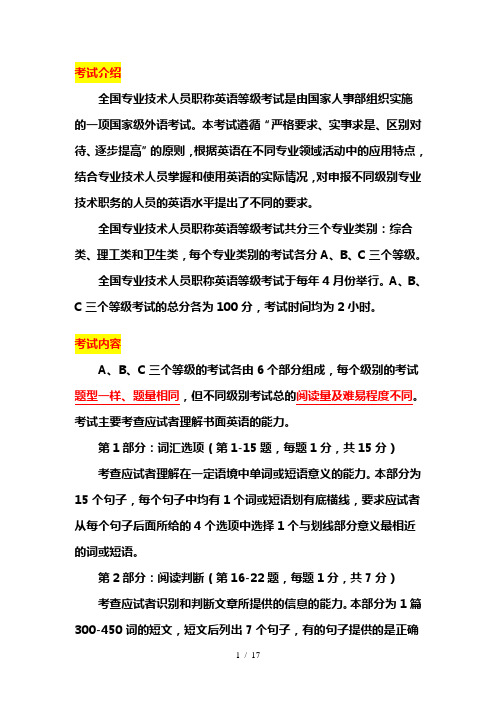
考试介绍全国专业技术人员职称英语等级考试是由国家人事部组织实施的一项国家级外语考试。
本考试遵循“严格要求、实事求是、区别对待、逐步提高”的原则,根据英语在不同专业领域活动中的应用特点,结合专业技术人员掌握和使用英语的实际情况,对申报不同级别专业技术职务的人员的英语水平提出了不同的要求。
全国专业技术人员职称英语等级考试共分三个专业类别:综合类、理工类和卫生类,每个专业类别的考试各分A、B、C三个等级。
全国专业技术人员职称英语等级考试于每年4月份举行。
A、B、C三个等级考试的总分各为100分,考试时间均为2小时。
考试内容A、B、C三个等级的考试各由6个部分组成,每个级别的考试题型一样、题量相同,但不同级别考试总的阅读量及难易程度不同。
考试主要考查应试者理解书面英语的能力。
第1部分:词汇选项(第1-15题,每题1分,共15分)考查应试者理解在一定语境中单词或短语意义的能力。
本部分为15个句子,每个句子中均有1个词或短语划有底横线,要求应试者从每个句子后面所给的4个选项中选择1个与划线部分意义最相近的词或短语。
第2部分:阅读判断(第16-22题,每题1分,共7分)考查应试者识别和判断文章所提供的信息的能力。
本部分为1篇300-450词的短文,短文后列出7个句子,有的句子提供的是正确信息,有的句子提供的是错误信息,有的句子的信息在短文中并未直接或间接提及。
要求应试者根据短文的内容对每个句子做出判断。
第3部分:概括大意与完成句子(第23-30题,每题1分,共8分)考查应试者把握文章段落大意及细节的能力。
本部分为1篇300-450词的短文,有2项测试任务:(1)短文后有6个段落小标题,要求应试者根据文章的内容为其中指定的4个段落各选择一个正确的小标题;(2)短文后有4个不完整的句子,要求应试者在所提供的6个选项中选择4个正确选项分别完成每个句子。
第4部分:阅读理解(第31-45题,每题3分,共45分)考查应试者对文章主旨和细节信息的理解能力。
英语专业四级考试真题及答案
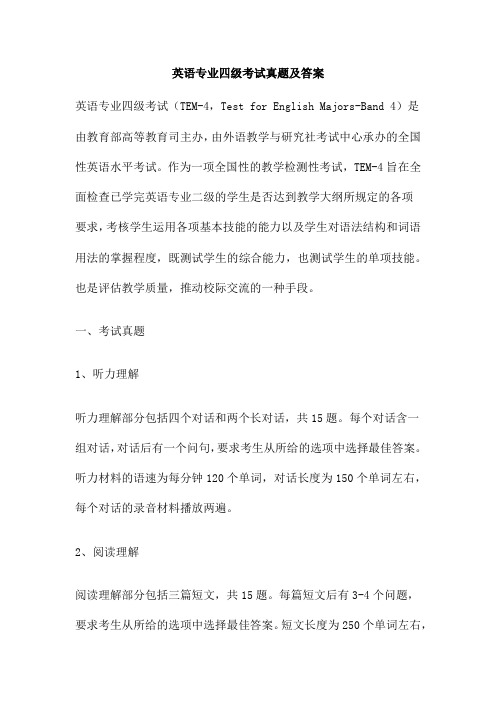
英语专业四级考试真题及答案英语专业四级考试(TEM-4,Test for English Majors-Band 4)是由教育部高等教育司主办,由外语教学与研究社考试中心承办的全国性英语水平考试。
作为一项全国性的教学检测性考试,TEM-4旨在全面检查已学完英语专业二级的学生是否达到教学大纲所规定的各项要求,考核学生运用各项基本技能的能力以及学生对语法结构和词语用法的掌握程度,既测试学生的综合能力,也测试学生的单项技能。
也是评估教学质量,推动校际交流的一种手段。
一、考试真题1、听力理解听力理解部分包括四个对话和两个长对话,共15题。
每个对话含一组对话,对话后有一个问句,要求考生从所给的选项中选择最佳答案。
听力材料的语速为每分钟120个单词,对话长度为150个单词左右,每个对话的录音材料播放两遍。
2、阅读理解阅读理解部分包括三篇短文,共15题。
每篇短文后有3-4个问题,要求考生从所给的选项中选择最佳答案。
短文长度为250个单词左右,难度与本专业基础阶段英语教材水平相近。
3、完型填空完型填空是一篇200个单词左右的短文,其中有10个空格,每个空格为一题。
要求考生从所给的选项中选择最佳答案,使短文的意思和结构恢复完整。
4、写作和翻译写作部分要求考生写一篇100-120个单词的短文,内容涉及本专业领域,文体包括叙述文、说明文和议论文等。
翻译部分包括一段30个单词左右的句子翻译成英文,和一段40个单词左右的段落翻译成中文。
二、答案分析1、听力理解听力理解部分主要考察学生的听力技能和对语言的理解能力。
在答题时,要认真听取录音材料中的对话和问题,抓住关键词汇,推断对话中的语境和含义,然后从所给的选项中选择最佳答案。
2、阅读理解阅读理解部分主要考察学生的阅读技能和对语言的理解能力。
在答题时,要快速阅读全文,理解文章的主旨和重点内容,然后根据问题从文章中寻找相关信息,并从所给的选项中选择最佳答案。
3、完型填空完型填空部分主要考察学生的词汇和语法知识。
045108-学科教学(英语)(考试大纲)
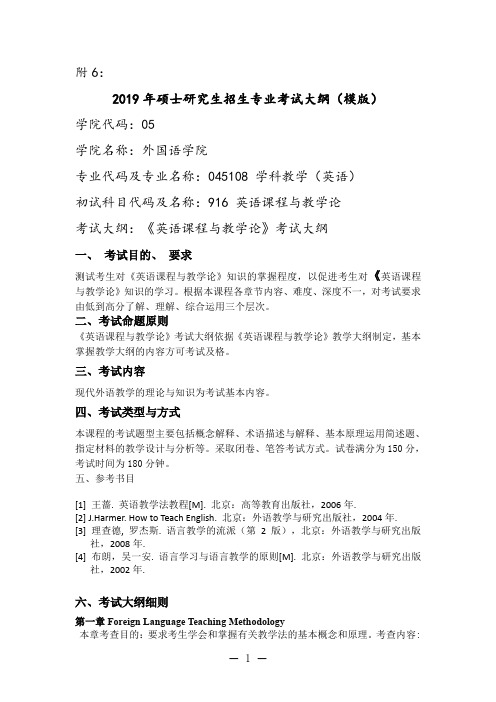
附6:2019年硕士研究生招生专业考试大纲(模版)学院代码:05学院名称:外国语学院专业代码及专业名称:045108 学科教学(英语)初试科目代码及名称:916 英语课程与教学论考试大纲:《英语课程与教学论》考试大纲一、考试目的、要求测试考生对《英语课程与教学论》知识的掌握程度,以促进考生对《英语课程与教学论》知识的学习。
根据本课程各章节内容、难度、深度不一,对考试要求由低到高分了解、理解、综合运用三个层次。
二、考试命题原则《英语课程与教学论》考试大纲依据《英语课程与教学论》教学大纲制定,基本掌握教学大纲的内容方可考试及格。
三、考试内容现代外语教学的理论与知识为考试基本内容。
四、考试类型与方式本课程的考试题型主要包括概念解释、术语描述与解释、基本原理运用简述题、指定材料的教学设计与分析等。
采取闭卷、笔答考试方式。
试卷满分为150分,考试时间为180分钟。
五、参考书目[1] 王蔷. 英语教学法教程[M]. 北京:高等教育出版社,2006年.[2] J.Harmer. How to Teach English. 北京:外语教学与研究出版社,2004年.[3] 理查德, 罗杰斯. 语言教学的流派(第2版),北京:外语教学与研究出版社,2008年.[4] 布朗,吴一安. 语言学习与语言教学的原则[M]. 北京:外语教学与研究出版社,2002年.六、考试大纲细则第一章Foreign Language Teaching Methodology本章考查目的:要求考生学会和掌握有关教学法的基本概念和原理。
考查内容:1. Understanding Foreign Language Teaching Methodology2. Disciplines Contributing to Foreign Language Teaching (FLT)3. Factors Influencing Foreign Language Teaching and Learning。
1579596821079_中国石化集团公司专业技术人员外语水平测试样卷20200121

中国石化专业技术人员外语水平考试英语(120分钟内完成)第一部分客观题(50分钟)一、词汇与用法(根据文意,从A、B、C、D四个选项中选择一个正确答案,共10分)1. It is my _____ to speak in front of you today.A. happyB. gladC. graceD. honor2. — ______ you visit the Great Wall while you were in China, Nancy?— Of course!A. DoB. DidC. HaveD. Will3. All the students ____ John went to the park on Sunday. He was ill.A. besidesB. exceptC. withD. without4. —Oh my god, the computer won’t start!—____, I can get it fixed.A. Not at allB. Never mindC. What a pityD. How dare you5. I didn’t think you would arrive so soon. How long did it ____ you to get here?A. goB. coverC. makeD. take6. John has two sisters; one is Mary, and ____ is Linda.A. anotherB. the othersC. the otherD. other7. — Can you speak French?— I cannot, ____ I can speak German.A. andB. butC. otherwiseD. or8. — Do you know ____ the ticket is?— Yes, thirty dollars.A.how longB. how oftenC. how muchD. how soon9. I've decided to ____ your advice and stop smoking for good.A. takeB. receiveC. believeD. consider10. — Why are you ____ all the pictures?— I'm going to paint the walls.A. hanging upB. putting offC. carrying outD. taking down二、阅读理解(阅读下面的短文,根据文章内容,从每题所给的A、B、C、D四个选项中选择一个正确答案,共40分)短文一(10分)Christmas Eve arrives at my house each year. The center of the celebration is dinner. My mother spends days preparing a rich variety of seafood. The guest list seldom changes. It is made up of my Aunt Marcy and her husband, my oldest brother, Sal, his wife, and their four children, my sister, Joann, her husband, and their two children, and my second brother, Richard, his wife, and their two children.My aunt and uncle always come heavily loaded with enough food and wine for a whole army. My brother Sal and gang usually show up an hour early and empty-handed. Joann's family is usually late while Richard's group generally arrives on time, bearing gifts for everyone. I am in charge of getting the Christmas tree. Plenty of food is served at the dinner table, and all the hours of preparation are wolfed down in a matter of minutes. Along with the yearly repeated menu comes the yearly repeated conversation. Everyone talks about how good the food tastes. My mother then talks about all the supermarkets from which the fish was bought. This begins our period of comparison shopping. For at least thirty minutes, we show how better we are than each other at mentioning the bargains we have found.Personally, I do not feel they need to be with a crowd on Christmas Eve. Christmas Eve, to me, is a quiet time, a time to think deeply. The over-crowdedness and noise ruin my feelings about Christmas.1. What is the first paragraph mainly about?A. Dinner at the writer's house.B. Seafood at the writer's house.C. Christmas guests at the writer's house.D. The writer’s mother.2. What can be inferred from the second paragraph?A.The writer’s aunt and uncle provide all the food for the dinner.B.Sal and his family seldom bring food or gifts to the dinner.C.The writer thinks highly of her aunt and uncle.D.The dinner usually lasts long because it takes a long time to eat all the food.3. According to the passage, one of the main subjects discussed at the dinner table is____.A. the price of goodsB. the kind of seafoodC. the preparation of fishD. the change of the menu4. The word “bargains” in Paragraph 3 is closest in meaning to ____.A. productsB. servicesC. goodsD. deals5. What’s the writer’s attitude toward Christmas?A. She thinks Christmas at her house is too lonely.B. She thinks people eat too much food on Christmas.C. She likes to be quiet and think deeply on Christmas.D. She likes to do the preparation work for Christmas.短文二(10分)Now that man has actually landed on the surface of the moon, he has learned many new things about it. But one thing man knew before he ever reached the moon was that there was no life on it.There is no air on the moon. The lack of air means that the moon is not protected from any of the sunshine. The sun sends out heat and light radiation. Life on earth depends on heat and light. But the sun also sends out dangerous kinds of radiation. The earth’s air protects us from most of them. On the moon, however, there is no air to stop the radiation. All the sunshine beat down on the surface of the moon.Because there is no air, the moon’s surface is either extremely hot or extremely cold. As the moon circles around the earth, the side of it that is lighted up by the sun becomes very hot. The temperature there reaches more than 300℉(212℉=100℃). This is hotter than boiling water. The hot lunar day lasts two weeks. It is followed by a night that is also two weeks long. At night the temperature drops to 260 degrees below zero. This is more than twice as cold as temperatures reached at the earth’s South Pole. Under these conditions, no form of life that we know of here on earth could exist on the moon.6.What does the passage mainly talk about?A.The reasons why man wanted to land on the moon.B.The reasons why the moon is colder than the earth.C.The reasons why there is no life on the moon.D.The reasons why there is no air on the moon.7.The word “them” in Paragraph 2 refers to_____.A.heatB.lightC.radiationsD.sunshine8.According to Paragraph 2, which of the following is TRUE?A.Almost all radiations from the sun are dangerous.B.Life on earth relies on heat and light radiations.C.The moon has no forms of protection at all.D.Harmful radiation will destroy the moon in the future.9.The word “beat down” in Paragraph 2 is closest in meaning to ______.ndB.hitC.stopD.send10.How hot can it be on the side of the moon lighted up by the sun?A.More than 260℉.B.More than 100℉.C.More than 130 ℉.D.More than 75 ℉.短文三(10分)A CV is an outline of a person’s educational and professional history. In some countries, like the USA, it is known as a resume. There is no one correct way to construct a CV. But there are two principles. First, make it clear. Use direct, simple language, short headings and highlight the important things like the titles of previous jobs. Second, make it short. It should be no more than two sides of paper. A busy human resources manager with 20 CVs to read in half an hour won’t want to read anything longer.Standard CVs are usually divided into at least four sections. The first section is personal details. These are facts about you and how to contact you. This section should include your name, address, date of birth, and nationality. Some people attach a passportsize photo which can help attract an employer’s interest.The second section is education. This should outline your educational history and your qualifications. There’s no need to give details about primary or elementary school. If you left school some years ago and have done professional training courses, it may be more important to highlight these. In this case, you can call this section “Education and training”.The third section is employment. This should include the different jobs you have done. Start with the most recent job. You should also list the main duties of each job as it may not be clear from the job title.The fourth section is personal profile. This part describes what kind of person you are. Try to write down ten words or phrases which describe your good points. Then put them into a paragraph. Don’t be modest and use phrases like “fairly good”. Other applicants will write the best descriptions that they can.11. What is the passage mainly about?A. To help employers choose people wisely.B. To help people find what kind of persons they are.C. To compare different CVs.D. To help people learn how to write a CV.12. According to paragraph 1, which is one of the principles for constructing a CV?A. Make the CV hard to understand.B. Highlight important content.C. Make the CV as long as you can.D. Use complicated language.13. Which of the following sentences should appear in a good CV?A. Education: 1993-1998 NO.1 elementary school.B. I am a team worker who enjoys challenges.C. I usually work hard.D. Age: 31 years old.14. According to the passage, what should you do when writing a CV?A. Use simple language and make it concise.B. Write down all the education and training experiences.C. Highlight the nationality which helps attract attention.D. Use one word or phrase to describe what kind of person you are.15. The word “modest” in the last paragraph is closest in meaning to .A. humbleB. tenderC. plainD. easy短文四(10分)●本部分包含三篇文章,请根据个人工作专业方向,选择一篇作答。
园林专业外语考试词汇
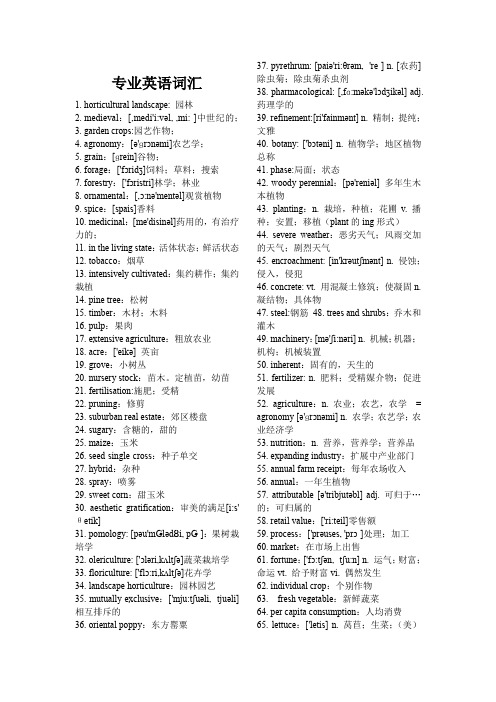
专业英语词汇1. horticultural landscape: 园林2. medieval:[,medi'i:vəl, ,mi:-]中世纪的;3. garden crops:园艺作物;4. agronomy:[ə'ɡrɔnəmi]农艺学;5. grain:[ɡrein]谷物;6. forage:['fɔridʒ]饲料;草料;搜索7. forestry:['fɔristri]林学;林业8. ornamental:[,ɔ:nə'mentəl]观赏植物9. spice:[spais]香料10. medicinal:[me'disinəl]药用的,有治疗力的;11. in the living state:活体状态;鲜活状态12. tobacco:烟草13. intensively cultivated:集约耕作;集约栽植14. pine tree:松树15. timber:木材;木料16. pulp:果肉17. extensive agriculture:粗放农业18. acre:['eikə] 英亩19. grove:小树丛20. nursery stock:苗木。
定植苗,幼苗21. fertilisation:施肥;受精22. pruning:修剪23. suburban real estate:郊区楼盘24. sugary:含糖的,甜的25. maize:玉米26. seed-single-cross:种子单交27. hybrid:杂种28. spray:喷雾29. sweet corn:甜玉米30. aesthetic gratification:审美的满足[i:s'θetik]31. pomology: [pəu'mǤlədȢi, pǤ-]:果树栽培学32. olericulture: ['ɔləri,kʌltʃə]蔬菜栽培学33. floriculture: ['flɔ:ri,kʌltʃə]花卉学34. landscape horticulture:园林园艺35. mutually exclusive:['mju:tʃuəli, -tjuəli]相互排斥的36. oriental poppy:东方罂粟37. pyrethrum: [paiə'ri:θrəm, -'re-] n. [农药] 除虫菊;除虫菊杀虫剂38. pharmacological: [,fɑ:məkə'lɔdʒikəl] adj. 药理学的39. refinement:[ri'fainmənt] n. 精制;提纯;文雅40. botany: ['bɔtəni] n. 植物学;地区植物总称41. phase:局面;状态42. woody perennial:[pə'reniəl] 多年生木本植物43. planting:n. 栽培,种植;花圃v.播种;安置;移植(plant的ing形式)44. severe weather:恶劣天气;风雨交加的天气;剧烈天气45. encroachment: [in'krəutʃmənt] n. 侵蚀;侵入,侵犯46. concrete: vt. 用混凝土修筑;使凝固n. 凝结物;具体物47. steel:钢筋48. trees and shrubs:乔木和灌木49. machinery:[mə'ʃi:nəri] n. 机械;机器;机构;机械装置50. inherent:固有的,天生的51. fertilizer: n. 肥料;受精媒介物;促进发展52. agriculture:n. 农业;农艺,农学= agronomy [ə'ɡrɔnəmi] n. 农学;农艺学;农业经济学53. nutrition:n. 营养,营养学;营养品54. expanding industry:扩展中产业部门55. annual farm receipt:每年农场收入56. annual:一年生植物57. attributable [ə'tribjutəbl] adj. 可归于…的;可归属的58. retail value:['ri:teil]零售额59. process:['prəuses, 'prɔ-]处理;加工60. market:在市场上出售61. fortune:['fɔ:tʃən, -tʃu:n] n. 运气;财富;命运vt. 给予财富vi. 偶然发生62. individual crop:个别作物63. fresh vegetable:新鲜蔬菜64. per capita consumption:人均消费65. lettuce:['letis] n. 莴苣;生菜;(美)纸币66. celery:n. 芹菜67. starch root crop:淀粉作物根68. citrus fruit:['sitrəs] n. 柑橘属果树;柑橘类的植物adj. 柑橘属植物的69. fresh-equivalent:[i'kwivələnt]同等新鲜的70. historical perspective:历史展望71. primitive society:原始社会72. sustenance:['sʌstenəns] n. 生计;食物;支持73. era:['iərə, 'εərə] n. 时代;年代;纪元74. gene synthesis:['sinθisis]基因合成75. genetic code deciphered:遗传密码破译76. isolation of phytochrome: ['faitəu,krəum]( n. [植][生化] 光敏色素;植物色素)色素的分离77. mechanical harvesting:机械收割78. plastic films:塑料薄膜79. radiation preservation:辐射保鲜80. polyploid and mutation breeding:多倍体和诱变育种81. organic phosphate pesticide: [ɔ:'ɡænik] adj. 有机的;器官的;组织的;根本的['fɔsfeit] n. [化]磷酸盐;[地]皮膜化成['pestisaid]n. 杀虫剂有机磷酸盐农药有机磷酸盐农药有机磷酸盐农药有机磷酸盐农药82. weed:vt. 除草;铲除n. 杂草,野草;菸草vi. 除草83. tissue culture:组织培养;体素培养84. culture ['kʌltʃə] n. 文化,文明;修养;栽培vt. 培养(等于cultivate)85. auxin: ['ɔ:ksin] n. [生化]植物生长素;植物激素86. respiration cycle:[,respə'reiʃən] n. 呼吸;呼吸作用呼吸循环呼吸循环呼吸循环呼吸循环????87. hybrid corn:[美国英语]杂交种玉米88. photoperiodism: [,fəutə'piəriədizəm] n. [农学] 光周期现象(=photoperiodicity);[生物] 光周期性(=photoperiodicity)89. gasoline powered tractor:烧汽油的拖拉机['ɡæsəli:n]90. essential element :基本元素必需元素91. cyclopedia:百科全书92. laws of heredity: [hi'rediti]遗传律93. plant pathology:植物病理学[亦作phytopathology] [pə'θɔlədʒi] [,faitəupə'θɔlədʒi] 94. modern plow:[plau] 现代耕作95. reaper:['ri:pə] n. 收割者;收割机;收获者96. canning:n. 罐头制造;装罐v.把食物等装罐(can的ing形式)adj. 罐头加工的;装罐头的97. gardens of Versailles:[vεə'sai] n. 凡尔赛(法国城市)凡尔赛花园98. microscope:显微镜99. importation:进口100. species ['spi:ʃi:z; -si:z] n. 物种;种类adj. [生物]物种上的101. monastery garden:['mɔnəstəri] n. 修道院;僧侣;寺庙102. herb【植物学】草本植物;草103. legume rotation: ['leɡju:m] n. 豆类;豆科植物;豆荚[rəu'teiʃən]【农业】轮种,轮作104. Theophrastus: [,θi:ə'fræstəs; ,θiə-] 泰奥弗拉斯托斯(约公元前372~约前287,古希腊哲学家、自然科学家105. hanging garden of Babylon:古巴比伦的空中花园106. cultivar: ['kʌltivɑ:] n. 培育植物;栽培变种107. grafting: 【园艺学】嫁接108. irrigation: [,iri'ɡeiʃən] 灌溉109. crop plant:作物;农作物110. domestication: [dəu,mestikeiʃən] n. 驯养;教化;培育111. Neolithic age [,ni:əu'liθik] 新石器时代112. accumulation:[ə,kju:mju'leiʃən] n. 积聚,累积;堆积物113. surplus:n. 过剩;盈余;剩余;顺差adj.剩余的;过剩的114. specialist:专家artisan:[,ɑ:ti'zæn, 'ɑ:tizən] n. 工匠,技工115. clerk:[klɑ:k, klə:k]职员116. priest:[pri:st] n. 牧师;神父;教士vt. 使成为神职人员;任命…为祭117. plant body::::植物体flowering plant:有花植物,显花植物118. extreme diversity:极端多样性119. size and structure:大小和结构120. essential similarities:基本相似121. air-borne root:气生根122. orchid:['ɔ:kid]兰花;淡紫色;兰科植物123. swollen root:['swəulən]膨胀根124. sweet potato:红薯125. superficial:[,sju:pə'fiʃəl] adj. 表面的;肤浅的126. functionally:功能地127. morphological:[,mɔ:fə'lɔdʒikəl] adj.形态的;形态学的[亦作morphologic] 128. underground:地下的;秘密的;先锋派的129. shoot:芽;苞;苗;嫩枝嫩枝嫩枝嫩枝130. stem:1. (植物的)茎2. (树木的)干3. (叶、花、果的)柄4. 叶柄;花梗131. enlarged portion:膨大部分132. node:[nəud] n. 节点;瘤;叉点133. significant modification:显著变异134. miniature leafy:微型叶135. bud:芽,萌芽;蓓蕾136. microscopic:[,maikrə'skɔpik] adj. 用显微镜可见的;微观的137. component: [kəm'pəunənt] adj. 组成的,构成的n. 成分;元件;组件138. cell:【植物学】子房室;花粉囊;孢子囊【生物学】细胞139. structure unit:结构单元140. cytology:[sai'tɔlədʒi] n. [生]细胞学141. multicellular organism:[,mʌlti'seljulə] adj. [生物] 多细胞的;多空隙的['ɔ:ɡənizəm] n. 有机体;生物体;微生物多细胞生物142. integrated collection:['intiɡreitid] adj. 综合的;完整的;互相协调的统一体?143. synchronisation: [,siŋkrənai'zeiʃən, sin-, -ni'z-] n. 同步;同一时刻;同时发生144. co-ordination: n. 协调;配合145. entity: ['entəti] n. 实体;存在;本质146. spherical: ['sferikəl, 'sfiə-] adj. 球形的,球面的;天体的147. polyhedral: [,pɔli'hi:drəl, -'he-] adj. [数] 多面的;[数] 多面体的148. ameboidal:149. tubular: ['tju:bjulə] adj. 管状的150. fiber:纤维151. staining:['steiniŋ] 【微生物学】着色,染色152. nucleus:['nju:kliəs] 【植物学】籽仁【生物学】细胞核153. cell wall:[细胞] 细胞壁,胞壁;格式壁154. cytoplasm: ['saitəuplæzəm] n. [细胞] 细胞质155. organelle: [,ɔ:ɡə'nel]n. [细胞] 细胞器;细胞器官156. plastid: ['plæstid] n. 质体;色素体;成形粒157. mitochondria: [,maitəu'kɔndriə] n. 线粒体(mitochondrion的复数)158. vacuole: ['vækjuəul] n. [细胞] 液泡;[地质] 空泡159. crystal: crystal ['kristəl] 水晶;结晶,晶体;水晶饰品160. starch grain:淀粉粒161. oil droplet:['drɔplit]油滴162. substance:n. 物质;实质;主旨;资产163.protoplasm: ['prəutəu,plæzəm] n. 原生质;原浆;细胞质164. fresh weight:鲜重165. organic and inorganic substances:有机和无机物质166. dissolved:adj. 溶解的;溶化的v.使溶解;使溶化(dissolve的过去分词)167. salt:盐168. carbohydrate:[,kɑ:bəu'haidreit] n. 糖类;碳水化合物169. colloidal state:[kə'lɔidəl] adj. 胶体的;胶质的;胶状的胶状胶状胶状胶状170. protein:['prəuti:n, -ti:in] n. 蛋白质;朊171. n. 蛋白质;朊172. physiological activity:[,fiziə'lɔdʒikəl] adj. 生理学的,生理的生理行为生理行为生理行为生理行为173. vital process:['vaitəl] adj. 生死攸关的;至关重要的;有活力的['prəuses, 'prɔ-]过程,进行;方法,步骤;作用;程序;推移174. photosynthesis:[,fəutə'sinθəsis] n. [化]光合作用175. plasma membrane:质膜;浆膜(等于cell membrane)['plæzmə] ['membrein] 176. permeable:['pə:miəbl] adj. 能透过的;有渗透性的177. solute and solvent: 溶质和溶剂178.semipermeable:[,semi'pə:miəbl, ,semai-] adj. 半渗透的179. lipoprotein:[,lipəu'prəutin, lai-] n. [生化] 脂蛋白180. elasticity:[,elæs'tisəti] n. 弹性;弹力;灵活性181. permeability: [,pə:miə'biliti] n. 弥漫;渗透性182. fatty substance:脂肪物质183. ultramicroscopic:超倍显微镜的184. thickness:厚度185. plasmolyzed cell: ['plæzməlaiz] 质壁分离的细胞186. electron microscope:电子显微镜187. structural definition:结构的含义188. permeate:['pə:mieit] vt. 弥漫;渗透,透过vi. 透入;弥漫;散布189. internal membrane:【生物学】内膜190.external membrane:外膜191.endoplasmic reticulum: 细胞] 内质网[,endəu'plæzmik] adj. 内质的[ri'tikjuləm] n. [天]网罟座(南天的星座);网状组织,网状质;蜂巢胃192.affinity: [ə'finəti] 亲和性193. dye: n. 染料;染色vt. 染;把…染上颜色vi. 被染色194. conspicuous feature: [kən'spikjuəs]:显著特征195. stained cell:被染色的细胞196. chromosome:['krəuməsəum] n. 染色体(形容词chromosomal,副词chromosomally)197. deoxyribonucleic acid: [di:'ɔksi,raibəu'nju:kli:ik] adj. 脱氧核糖核的DNA 脱氧核糖脱氧核糖脱氧核糖脱氧核糖核酸核酸核酸核酸198. punch card:穿孔卡片(等于punched card)199.ribonucleic acid:RNA [,raibəunju:'kli:ik, -'klei-] [生化] 核糖核酸200. protein synthesis : [生化] 蛋白质合成['sinθisis]201. particle:: ['pɑ:tikl] n. 颗粒;质点;极小量;小品词202. ribosome: n. 核糖体203. metabolic and morphological feature: [,metə'bɔlik,-kəl] adj. 新陈代谢的;变化的[,mɔ:fə'lɔdʒikəl] adj. 形态学的代谢和形态特征代谢和形态特征代谢和形态特征代谢和形态特征204. organism:['ɔ:ɡənizəm] n. 有机体;生物体;微生物205. hereditary bridge:[hi'reditəri]遗传桥梁206. deposit: [di'pɔzit]沉淀物207. secretion:[si'kri:ʃən] 分泌物208. compound:化合物209. polysaccharide material: [,pɔli'sækəraid, -rid]多糖物质210. long-chain unit:长链单位211. simple sugar:【化学】单糖212. glucose: ['ɡlu:kəus] n. 葡萄糖;葡糖(等于dextrose)213. lignin: ['liɡnin] n. [木] 木质素214. pectin: ['pektin] n. [生化] 果胶;胶质215. cellulose: ['seljuləus] n. 纤维素;(植物的)细胞膜质216. unbranched polymer: ['pɔlimə] n. [化]聚合物没有分枝的聚合物没有分枝的聚合物没有分枝的聚合物没有分枝的聚合物?!?!?!?!217. molecule:['mɔlikjul] n. 分子;微小颗粒,微粒218. hemicellulose: [,hemi'seljuləus] n. [林] 半纤维素219. monosaccharide unit: [,mɔnəu'sækəraid; -rid]单糖单元220. derivative:[di'rivətiv] 衍生物,派生物221. combustible:[kəm'bʌstəbl] 易燃的;易激动的;燃烧性的222. indigestible: [,indi'dʒestəbl, in'dai-] adj. 难消化的;难理解的223. enzyme: ['enzaim] n. 酶224. bond: 化学键(= chemical bond) 225. bacteria: [bæk'tiəriə] n. 细菌226. ruminant: ['ru:minənt] adj. 反刍的;沉思的n. 反刍动物227. digestive tract: 消化道228. fermentation: [,fə:men'teiʃən] n. 发酵229. decomposition: [,di:kɔmpə'ziʃən] n. 分解,腐烂;变质230. host animal:寄主动物231. phenolic acid:[有化] 酚酸;酚醛酸[fi'nɔlik]232. lignifications: [,liɡnifi'keiʃən] n. 木质化;[植] 木化;[生化] 木质化作用233. inelastic: [,ini'læstik] adj. 无弹性的;无适应性的;不能适应的234. microbial deposition: [mai'krəubiəl] adj. 微生物的;由细菌引起的[,depə'ziʃən] n. 矿床;沉积物;革职微生物沉淀微生物沉淀微生物沉淀微生物沉淀235. yellowing: 黄化236. wood pulp: [纸] 木浆;木纤维;木质纸浆237. manufacture: 制造;制造业;产品238. acidic polysaccharide:酸性多糖酸性多糖酸性多糖酸性多糖239. water-soluble polymer ['wɔ:tə,sɔlju'bl; 'wɔ-]可溶于水的['pɔlimə] n. [化]聚合物水溶性水溶性水溶性水溶性聚合物聚合物聚合物聚合物240. galacturonic acid【生物化学】半乳糖醛酸241. sols and gels: [dʒel]溶胶和凝胶242. solidifying agent:固化剂243. jam:果酱244. jelly: 果冻;胶状物245. distinct layers:明显的分层246. middle lamella: [lə'melə]【生物学】中胶层,胞间层,中层247. pectinacious material:248. intercellular: [,intə'seljulə] adj. [细胞] 在细胞间的249. slimy nature rotted fruit:['slaimi] 分泌黏液的;覆有黏液的[rɔt] 腐烂;腐败;腐坏腐坏了然后处于分泌黏状物状态的水果?250. fungal organism:fungal ['fʌŋɡəl] adj. 真菌的(等于fungous)真菌生物真菌生物真菌生物真菌生物251. primary cell wall:初生细胞壁252. pectic compound:果胶的化合物253. secondary cell wall:次生细胞壁254. a mechanical function:某种机械(支撑)作用255. pierce:[piəs] 刺穿;洞察;响彻;深深地打动256. cytoplasmic strand [,saitəu'plæzmik] adj. 细胞质的[strænd] n. 海滨;线;串胞间连胞间连胞间连胞间连丝丝丝丝257. plasmodesmata: n. 胞间连丝(plasmodesma的复数形式)258. pit:凹陷259. disk-shaped:叠状的260. pigment:色素261. leucoplast ['lju:kəuplæst] n. [植] 白色体262. chromoplast: ['krəuməplæst] n. 成色素细胞;色素母细胞263. mature cell: [mə'tjuə]成熟细胞264. chlorophyll ['klɔrəfil] n. 叶绿素265. chloroplast: ['klɔ:rəuplæst] n. 叶绿体266. carbon dioxide: [无化] 二氧化碳['k ɑ:bən] [dai'ɔksaid]267. carbon-containing compound:含碳化合物268. spinach: ['spinidʒ, -itʃ] n. 菠菜269. grana: ['ɡrænə, 'ɡreinə] n. 基粒(granum的复数形式)270. thylakoid: ['θailəkɔid] n. [植] 类囊体(植物叶绿体中的蛋白质和脂肪膜皮,光合化学作用在此进行)271. stroma: ['strəumə] 基质272. self-replication: ['self,repli'leiʃən] 【生物化学】自我复制273. pre-existing adj. 先已存在的;原始的274. mitochondria:[,maitəu'kɔndriə] n. 线粒体(mitochondrion的复数)275. dense:稠密的276. granule:['ɡrænju:l] n. 颗粒277. phospholipid: [,fɔsfə'lipid, -'lai-] n. [生化] 磷脂278. enzymatic activity: 酶活性;酶活力279. oxidative metabolism:氧化代谢['ɔksideitiv] adj. [化学] 氧化的[mi'tæbəlizəm, me-] n. 新陈代谢280. adenosine triphosphate: [ə'denəsi:n, -sin] n. 腺苷,腺甘酸[trai'fɔsfeit] n. 三磷酸盐[生化生化生化生化] 三磷酸腺苷三磷酸腺苷三磷酸腺苷三磷酸腺苷=A TP 281. vacuole: ['vækjuəul] n. [细胞] 液泡;[地质] 空泡282. membrane-lined cavity:283. cell sap: 【生物学】细胞液284. organic metabolic constituents:器官代谢要素285. coalesce:[,kəuə'les] 联合;合并;结合286. silica:['silikə] n. 硅土;二氧化硅287. resin:['rezin] n. 树脂;松香288. gum n. 树胶;橡皮;口香糖289. alkaloid: ['ælkəlɔid] n. 生物碱;植物碱基290. tissue system:组织系统291. fertilized egg :[胚] 受精卵,孕卵292. cell division: [细胞] 细胞分裂: 293. cell differentiation [,difərenʃi'eiʃən] 【生物学】细胞分化294. meristematic tissue: [,meristə'mætik]分生组织295. permanent tissue:['pə:mənənt]永久组织296. simple tissue:简单组织297. parenchyma: [pə'reŋkimə] n. [组织] 实质;软细胞组织薄壁组织薄壁组织薄壁组织薄壁组织298. collenchyma: [kə'leŋkimə] n. [植] 厚角组织299. sclerenchyma: [skliə'reŋkimə] 【植物学】厚壁组织300. complex tissue:复合组织301. xylem: ['zailəm, -lem] n. [植] 木质部302. phloem: ['fləuem] n. 筛部,[植] 韧皮部303. perpetuate: vt. 使不朽;保持304. demarcation: [,di:mɑ:'keiʃən] n. 划分;划界;限界305. tip:尖端;末端306. apical meristem: [植] 顶端分生组织['æpikəl] adj. 顶上的;顶点的307. growing point: 【植物学】生长点308. girth: [ɡə:θ] 周长309. woody stem:木本茎310. lateral meristem:【植物学】侧生分生组织['lætərəl] adj. 侧面的,横向的311. cambium: ['kæmbiəm] n. 形成层;新生组织312. intercalary meristem: 【植物学】居间分生组织[in'tə:kələri] adj. (历法)闰的;被夹于中间的;插入中间的313. mowing: ['məuiŋ]. 刈草;牧草地;一次所割之草314. primary tissue:初生组织315. inconspicuous vacuole:不显眼的液泡316. undifferentiated: adj. 无差别的;一致的317. vegetative tissue: ['vedʒitətiv] 促使植物生长的组织318. tuber:['tju:bə] n. [植]块茎;球根319. elongated cell:伸长细胞!?320. stalk:[stɔ:k] n. (植物的)茎,秆;(支持叶子、果实和花的)梗,柄321. taper:['teipə] 锥形;锥体;圆锥322. fibre:['faibə] n. 纤维;纤维制品323. sclereid: ['skliəriid; 'sklεə-]【植物学】硬化细胞,石质细胞324. stone cell: 硬化细胞,石质细胞325. gritty: ['ɡriti] adj. 有砂砾的;坚韧不拔的;多沙的;像砂的326. texture: ['tekstʃə] n. 质地;纹理;结构;本质,实质327. walnut shell:: ['wɔ:lnʌt, -nət] n. 胡桃木;胡桃[ʃel] n. 壳,贝壳;外形;炮弹328. water-conducting tissue:水分运输组织329. herbaceous plant:[hə:'beiʃəs, ə:-] adj. 草本的;叶状的;绿色的草本植物草本植物草本植物草本植物330. tracheid: [trə'ki:id, 'treiki-] n. [植] 管胞331. unevenly thickened:不均匀变厚332. sculpture:造型;雕塑333. longitudinal section:纵切面;纵切片[,lɔndʒi'tju:dinəl] adj. 长度的,纵向的;经线的334. vessel:['vesəl] 【植物学】导管[参较tracheid]335. perennial:[pə'reniəl] n. 多年生植物336. annual ring:[林] 年轮337. springwood,summerwood:春材?夏材?338. sieve element:筛分子;筛管分子339. sieve cell:筛胞340. sieve tube:筛管341. companion cell:【植物学】伴细胞342. hemp:n. 大麻;麻类植物;大麻烟卷343. flax:[flæks] n. [植]亚麻;[植]亚麻纤维;亚麻织品;亚麻布344. disintegrate:[dis'intiɡreit] vt. 使分解;使碎裂;使崩溃;[核]使衰变345. cork cambium: 【植物学】木栓形成层346. parenchymatous tissue: adj. 薄壁组织347. incidental tissue: [,insi'dentəl] adj. 偶然的;容易发生的;附带的348. bark: 【植物学】树皮;茎皮349. anatomical region: [,ænə'tɔmikəl] adj. 解剖的;解剖学的;结构上的['ri:dʒən] n. 地区;范围;部位解剖区域解剖区域解剖区域解剖区域350. vascular: ['væskjulə] 【植物学】维管的351. cortex: ['kɔ:teks] 【植物学】树皮;果皮352. epidermis: [,epi'də:mis] 【植物学】(种子植物和蕨类植物的)表皮(层);上皮353. pith: (植物的)木髓,树心354. pericycle: ['peri,saikl] n. [植] 中柱鞘355. endodermis: [,endəu'də:mis] n. 内皮356. secretory gland: [si'kri:təri] 分泌的;促进分泌的[ɡlænd] 【植物学】腺分泌腺分泌腺分泌腺分泌腺357. circulatory system::::[,sə:kju'leitəri, 'sə:kjulətəri] adj. 循环的循环系统循环系统循环系统循环系统358. skeletal system 骨骼系统['skelitəl] 359. buddle:【植物学】维管束[全称vas-cular bundle]360. cross section: 横断面,剖面,截面;横切片361.monocotyledonousplant:[,mɔnəu,kɔti'li:dənəs] 单子叶植物=monocotyledon ['mɔnəu,kɔti'li:dən]362. encircle: [in'sə:kl] vt. 环绕;围绕;包围363.predominantly: adv. 主要地;显著地364. cork: 【植物学】木栓层365. infiltrate: ['infiltreit; in'fil-]渗入366.suberin: ['sju:bərin] 软木脂367.waterproof: 防水的,不透水的使不透水,使防水368.suberization: [,sju:bərai'zeiʃən; -ri'z-]【植物学】栓化作用369.sheath:【植物】叶鞘,茎衣370. periderm: ['peridə:m] 【植物学】周皮371. callus tissue: ['kæləs] 愈伤组织372.corky:木栓化373. oak:橡树374. differentiation portion:分化部分375. rupture:['rʌptʃə] 破裂;决裂376. lenticel: ['lentisel] 【植物学】皮孔“breathing pore:呼吸孔377. root hair:根毛378. absorption:吸收(作用)379. inorganic nutrient:无机营养380. rose petal:玫瑰花瓣381. cuticle:表皮382. cutin: ['kju:tin] 【植物学】角质,蜡状质383. desiccation: [desi'kenʃən] n. 干燥384. nectarine: ['nektərin, ,nektə'ri:n] n. [园艺] 油桃;[园艺] 蜜桃385. gloss: [ɡlɔs] (表面的)光泽,色彩;光彩;光泽面386. screte or excrete:: vt. 分泌或排泄387. viscous: ['viskəs] adj. 粘性的;黏的(树叶等)表面有黏性分泌物的388. rubber: ['rʌbə] n. 橡胶;橡皮;合成橡胶;按摩师389. mucilage: ['mju:silidʒ] (植物分泌的)黏液,黏胶390. epidermal appendage: [ə'pendidʒ] 生物学】附器,附肢,附属物(如植物的枝、叶;狍尾和其他动物的尾、肢、鳍、翼、触角等) 表皮的附属物?391. trichome: ['traikəum; 'tri-]【植物学】(表皮)毛状体392. sub-epidermal:393. fragrance of flower:花的香味394. nectary: ['nektəri] 【植物学】蜜腺395. peel:皮去皮396. rind:[raind, rain] 1. 果皮;树皮硬壳;外壳;外皮397. volatile::::['vɔlətail] 挥发性的爆炸性的398. essential oil:香精油,精油;芳香油399. duct:【植物学】管,导管,脉管400. latex: ['leiteks] (植物)乳胶401. anglosperm family:被子植物402. laticifer: [lei'tisifə] 【植物学】乳汁细胞;乳汁管;乳汁器403. rubber tree:橡树404. excretory system:排泄系统405. : initial :最初的初始的406. yield:[ji:ld] 生产,生长出(作物),结出(果实)407. crude:天然的408. plantation rubber:[plæn'teiʃən] 栽植,种植大面积栽培植物409. spurge family:大戟科410. leaf blight:【植物病理学】叶烧病;叶枯病;叶疫病411. tropical zone:热带地区412. hemisphere:半球413. synthetic rubber:[sin'θetik]人造橡胶414. morphological structure:形态结构415. absolute bulk:绝对体积416. intimate contact:亲密接触417. superstructure:上层结构,超结构418. storage organ:存储器官419. seedling root:幼根420. primary root:初生根421. taproot system: ['tæpru:t; -rut] 【植物学】主根,直根直根系直根系直根系直根系422. beet:甜菜423. turnip:['tə:nip] n. 芜菁甘蓝,大头菜;萝卜424. fibrous root system:【植物学】须根系425. shallow-rooted:浅根的426. fertility treatment:427. modification:【生物学】诱发变异428. dahlia:['deiljə] n. 大丽花,大丽花属429. propagation:[,prɔpə'ɡeiʃən] n. 传播;繁殖;增殖430. palm:[pɑ:m] 【植物】棕榈树431. prostrate branch:['prɔstreit] 【植物学】蔓延的;匍匐的,爬地的匍匐枝匍匐枝匍匐枝匍匐枝432. creeper:【植物】匍匐植物;匍匐枝433. growth pattern:生长模型;生长模式434. main trunk:主干435. central leader:中央领导干?好像就是主干的意思吧哈哈436. erect 竖立的semierect 半竖立的437. vine:植]葡萄树;[植]藤本植物;[植]攀缘植物;[植]藤438. embryonic: stem: [,embri'ɔnik] 胚的;胚胎的439. dormancy bud:休眠种子440. terminal bud:顶芽441. lateral bud:侧芽442. leaf axis:叶脉???443. adventitious bud:【植物学】不定芽[,ædven'tiʃəs]444. mixed bud:混合芽?445. accessory bud:【植物学】副芽446. leaf arrangement:叶子的排列447. opposite:【植物学】(叶)对生的448. whirled: 旋转,回旋; (叶)对生的? 449. alternate: 【植物学】互生的;交互的450. spiral parttern:螺旋方式451. phyllotaxy:叶序452. taxonomic significance分类学意义[,tæksəu'nɔmik]453. throughout a genus: 在属[θru:'aut] 自始至终,到处;全部['dʒi:nəs] n. 类,种;属454. stem modification:茎的变态455. cylindrical:[si'lindrikəl] adj. 圆柱形的;圆柱体的456. alteration:改变457. bizarre:[bi'zɑ:] adj. 奇异的(指态度,容貌,款式等)458. crown:[kraun] 【植物学】树冠,树顶;根颈459. stolon: ['stəulɔn, -lən] [植] 匍匐枝;匍匐茎460. spurs: (树的)短枝461. below-ground:地下的462. bulb:【植物学】(洋葱、百合等的)球茎,球根,鳞茎;鳞茎植物;类似鳞茎的根463. corm:n. [植] 球茎464. rhizome: ['raizəum] n. 根茎;[植] 地下茎465. tuber: ['tju:bə] n. [植]块茎466. bald-cypress:光秃秃的柏树467. gibberellic acid: 赤霉酸468. crown division:469. asparagus: [ə'spærəɡəs] n. 芦笋;龙须菜;天冬470. horizontal branch: 水平分支471. fleshy bud: 肉质芽472. leafy rosette: [rəu'zet] 【植物学】莲座(叶)丛473. offsets:短匍匐枝474. slips:嫩枝475. suckers:根出条476. pips:徒长枝477. offshoots:萌蘖枝478. runner:【植物学】长匐茎,纤枝蔓藤植物479. internode: ['intənəud] 【植物学】节间480. shortened internode:节间缩短481. quince:n. [植]温柏;柑橘482. compressed modification 压缩改性483. onion:洋葱;洋葱头484. tulip:['tju:lip] n. 郁金香485. tunicate bulb: ['tju:nikit, -keit] adj. 有被囊的;有被膜的486. Easter lily: 复活节百合花487. scaly bulb: ['skeili] adj. 有鳞的;积垢的;劣等的488. bulbil: ['bʌlbil] n. 球芽489. aerial stem: 地上茎['εəriəl]aerialadj. 空气的;空中的,航空的;空想的490. rudimentary leaf: 基本叶[,ru:di'mentəri] rudimentary adj. 基本的;初步的;退化的;残遗的;未发展的491. gladiolus: n. [植]剑兰492. crocus: ['krəukəs] 【植物】藏红花属(Crocus) 植物493. iris: ['aiəris] 鸢尾属植物494. elongated internode:: 拉长节间495. turf grasses:草坪496. quack grass:匍匐冰草497. Canadian thistle:加拿大蓟498. light energy:光能499. blade:【植物学】(尤指草、谷类植物的)叶片,草叶叶身(区别于叶柄) 500. petiole: ['petiəul] n. [植] 叶柄;柄部501. outgrowth: n. 结果;副产物;自然的发展;分枝502. stipule: ['stipju:l] n. [植] 托叶503. vein: (植物的)叶脉504.dicot: ['daikɔt, dai'kɔtil] n. 双子叶植物505. monocot: ['mɔnəkɔt] n. 单子叶植物506. leaf blade: 叶片507.bilaterally symmetrical: 两侧对称的[bai'lætərəli] [si'metrikəl]508.radically symmetrical: 完全对称['rædikəli] adv. 根本上;彻底地;以激进的方式509. palisade cell: [植] 栅栏细胞;棚状细胞[,pæli'seid]510. spongy mesophyll: [植] 海绵叶肉['spʌndʒi] adj. 海绵状的;轻软的;多孔而有弹性的;有吸水性的['mesəufil] n. [植] 叶肉511. gaseous exchange:气体交换气体对流512. stomata: n. 气孔;口513. water vapour: 水蒸汽,水汽vapour['veipə] n. 蒸气(等于vapor);水蒸气514. sansevieria: [,sænsi'viəriə] n. 虎尾兰515. tendril: ['tendril] n. 卷须;蔓;卷须状物516. cabbage: ['kæbidʒ] n. 卷心菜,甘蓝菜,(俚)脑袋517. poinsettia: [pɔin'setiə, -'setə] n. 一品红;猩猩木;圣诞红518. sepal: ['si:pəl, 'sep-] n. 萼片;花萼the calyx:['keiliks, 'kæliks] n. 盏,[植] 花萼;杯状结构519. petal:['petəl] n. [植]花瓣the corolla: [kə'rɔlə] n. [植] 花冠520. perfume gland: 香水腺体521. nectar gland: 蜜腺522. viscous sugary substance: 糖物质粘性523. stamens: n. [植]雄蕊524. pollen-bearing anther: ['pɔlin]花粉['ænθə] n. 花药;花粉囊525. filament: ['filəmənt] 【植物学】(雄蕊的)花丝(某些藻类、菌类等的)丝状体;藻丝526. pistil: ['pistil] n. [植] 雌蕊527. ovule-bearing base ['əuvju:l, 'ɔ-] n. 胚珠;幼籽;卵细胞==ovary ['əuvəri] n. [植]子房;[解]卵巢528. style: 【植物学】花柱529. stigma: ['stiɡmə] n. [植] 柱头530. essentially modified:本质上变异531. enlarged portion:: 扩大的部分532. receptacle: [ri'septəkl] 【植物学】花托;花托状组织(如囊托、孢子托等533. complete flower:【植物学】完全花534. incomplete flower: [植] 不完全花,不全花535. pistillate flower [植] 雌花;雌性花;雌蕊花536. staminate flower【植物学】雄(蕊)花537.perfet/bisexual/hermaphroditic flower: 两性花[hə:,mæfrə'ditik]538.monoecious: [mɔ'ni:ʃəs, məu-] adj. [植][动] 雌雄同株的;[动] 雄雌同体的539. dioecious: [dai'i:ʃəs] adj. [植][动] 雌雄异体的540. date palm: 【植物】海枣(树),枣椰树(Phoenix dactylifera)[亦作date]541. papaya: [pə'pɑ:iə] n. 木瓜;番木瓜树542. muskmelon: ['mʌsk,melən] n. 甜瓜543. andromonoecious: [,ændrəumə'ni:ʃəs] adj. [植] 雄花两性花同株的;雄全同株的544. inflorescence: [,inflɔ:'resəns] n. 花;花序;开花545. a flower cluster: 一朵花集群546. withered : ['wiðəd] 枯萎的;憔悴的;雕谢了的;尽是皱纹的547. remnant: ['remnənt] 剩余;残余;残余物548. berry:浆果549. grape:葡萄550. hesperidium: [,hespə'ridiəm] n. [园艺] 柑果;柠檬果551. drupe:核果552. pome:仁果553. pod:荚果554. follicle:['fɔlikl]蓇葖果555. aniseed: ['ænisi:d] n. 八角;洋茴香556. capsules:蒴果557. colchicum: ['kɔltʃikəm] n. 秋水仙;秋水仙制成的麻药;秋水仙种子558. silique: [si'li:k, 'silik] n. [植] 长角果559. crucifer: ['kru:sifə] n. 执十字架的人;十字花科植物560. achene: [ə'ki:n] n. [植] 瘦果561. samara: ['sæmərə, sə'mɑ:rə] n. [植] 翼果,[植] 翅果562. maple: ['meipl] n. 枫树;淡棕色563. nut:核果564. multiple fruit:复果565. aggregate fruit:聚合果566. raspberry:['rɑ:zbəri, 'ræ-]【植物】悬钩子属(Rubus)植物567. caryopsis:颖果568. oat:燕麦569. pepo:瓠果570. cantaloupe: ['kæntəlu:p, -ləup] n. 哈密瓜;香瓜;[园艺] 罗马甜瓜571. almond: ['ɑ:mənd] n. 杏仁,杏树;杏仁状的东西572. ovary wall: 子房壁573. dehiscence: [di'hisəns] n. 裂开【植物学】裂开,开裂574. simple fruit: 单果575. succulent ['sʌkjulənt] n. 多汁植物;肉质植物576. parenchyma: [pə'reŋkimə] n. [组织] 实质;软细胞组织577. fleshy: 【植物学】(如某些果实含有)肉质的,多汁的;(叶子)肥厚鲜嫩的578. dry: 【植物学】(果)干的579. pericarp: ['perikɑ:p] n. 果皮580. exocarp: ['eksəukɑ:p] 【植物学】外果皮(如李皮) (=epicarp)581. mesocarp:中果皮582. endocarp:内果皮583. plum:n. 李子;洋李;紫红色;梅子584. schizocarp: 【植物学】分果,离果585. fig:无花果586. mulberry:桑树587. seed coat:【植物学】种皮,(尤指)棉籽皮588. miniature plant:['miniətʃə]微型植物589. embryo:['embriəu] 【植物学】胚[亦作embryon]590. union of gamete: ['ɡæmi:t] n. [生物] 配子,配偶子591. sex cell: 性细胞,生殖细胞592. mature: [mə'tjuə] vi. 到期;成熟593. plumule:: ['plu:mju:l] n. [植] 胚芽;绒羽=rudimentary shoot594. radicle: ['rædikl] 植物学】胚根;幼根= rudimentary root595. cotyledon: [,kɔti'li:dən] n. [植] 子叶=seed leaf596. hypocotyl [,haipə'kɔtil] n. 子叶下轴,[植] 下胚轴597. endosperm: ['endəuspə:m] n. [植] 胚乳598. seed germination: [,dʒə:mi'neiʃən] n. 发生;发芽;伟晶作用。
日语红宝书-N3文字词汇
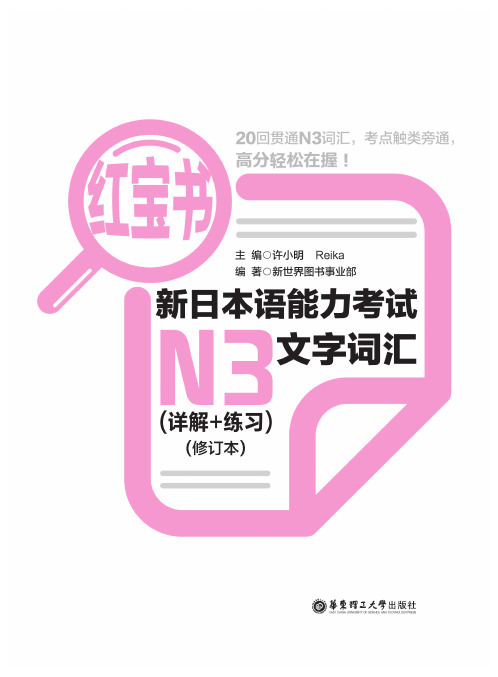
◇ 6 考查用平假名写的词,用汉字如何书写 ○ 11 考查单词在不同的语境中所表达的不同意思 ○ 5 考查意思相近的词语和表达方式
5 正确用法的选择 ○ 5 考查出题单词在句子中如何使用
1 文法形式的选择 文 法 2 句子的组合
3 文章中的文法
○ 13 选择与出题内容符合的文法形式 ◆ 5 组合用法正确、语意通顺的句子 ◆ 5 考查是否具备辨别文章中句子作用的能力
第1単元 ……………………………………………………………………………………………………… 10
「 愛 」 ~ 「 一 度 に 」(120個 ) 第1単元 練習問題 …………………………………………………………………………………………… 19
第2単元 ……………………………………………………………………………………………………… 22
听一段完整 的 文 章,考 查 对 内 容 是 否 理 解。(明 确 事 先 提 示 ◇ 6 的必须听懂的内容,抓住要点听。)
听一段完整 的 文 章,考 查 对 内 容 是 否 理 解。(理 解 整 篇 文 章 ◇ 3 所要表达的说话人的意图或主张等。) ◆ 4 边看插图边听状况的说明。考查选择适当发言的能力
编委会名单
主 编 许小明 Reika 编 著 新世界图书事业部 钟 雁 刘学敏 陈晓宇
张 蕾 吴秀华
前 言
新世界图书事业部自2011 年 3 月 推 出《红 宝 书 新 日 本 语 能 力 考 试 文 字 词 汇(详 解 + 练 习)》 系列丛书以来,广受好 评,成 为 很 多 参 加 能 力 考 试 的 学 习 者 的 必 备 用 书。 新 日 本 语 能 力 考 试 自 2010年7月至今已实施了四年,为了使本系列丛 书 的 内 容 更 加 充 实、完 善,更 好 地 体 现 考 试 的 倾 向,我们于2014年1月推出了本系 列 丛 书 的 全 新 修 订 版 本。 修 订 版 本 的 推 出,将 有 助 于 学 习 者 更好地掌握日语的文字词汇。
日语专业八级词汇
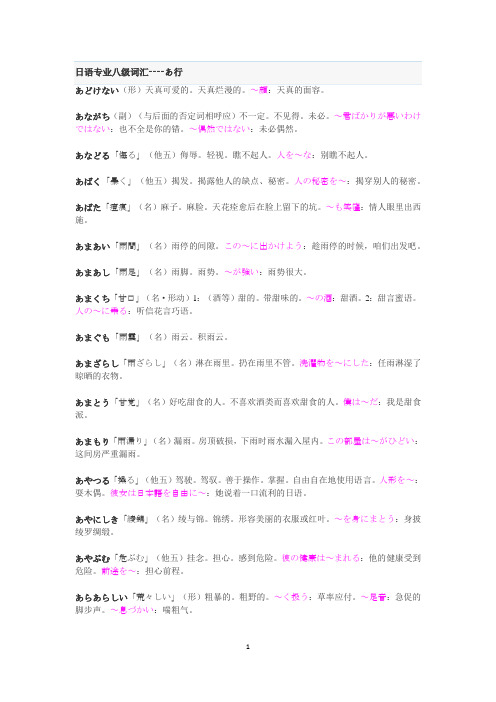
日语专业八级词汇----あ行あどけない(形)天真可爱的。
天真烂漫的。
~顔:天真的面容。
あながち(副)(与后面的否定词相呼应)不一定。
不见得。
未必。
~君ばかりが悪いわけではない:也不全是你的错。
~偶然ではない:未必偶然。
あなどる「侮る」(他五)侮辱。
轻视。
瞧不起人。
人を~な:别瞧不起人。
あばく「暴く」(他五)揭发。
揭露他人的缺点、秘密。
人の秘密を~:揭穿别人的秘密。
あばた「痘痕」(名)麻子。
麻脸。
天花痊愈后在脸上留下的坑。
~も笑窪:情人眼里出西施。
あまあい「雨間」(名)雨停的间隙。
この~に出かけよう:趁雨停的时候,咱们出发吧。
あまあし「雨足」(名)雨脚。
雨势。
~が強い:雨势很大。
あまくち「甘口」(名·形动)1:(酒等)甜的。
带甜味的。
~の酒:甜酒。
2:甜言蜜语。
人の~に乗る:听信花言巧语。
あまぐも「雨雲」(名)雨云。
积雨云。
あまざらし「雨ざらし」(名)淋在雨里。
扔在雨里不管。
洗濯物を~にした:任雨淋湿了晾晒的衣物。
あまとう「甘党」(名)好吃甜食的人。
不喜欢酒类而喜欢甜食的人。
僕は~だ:我是甜食派。
あまもり「雨漏り」(名)漏雨。
房顶破损,下雨时雨水漏入屋内。
この部屋は~がひどい:这间房严重漏雨。
あやつる「操る」(他五)驾驶。
驾驭。
善于操作。
掌握。
自由自在地使用语言。
人形を~:耍木偶。
彼女は日本語を自由に~:她说着一口流利的日语。
あやにしき「綾錦」(名)绫与锦。
锦绣。
形容美丽的衣服或红叶。
~を身にまとう:身披绫罗绸缎。
あやぶむ「危ぶむ」(他五)挂念。
担心。
感到危险。
彼の健康は~まれる:他的健康受到危险。
前途を~:担心前程。
あらあらしい「荒々しい」(形)粗暴的。
粗野的。
~く扱う:草率应付。
~足音:急促的脚步声。
~息づかい:喘粗气。
あらがう「抗う」(自五)争论。
争辩。
反抗。
運命に~:和命运抗争。
あらかた「粗方」(副)大概。
大致。
大体上。
クラスの~が進学希望だ:班里的绝大部分同学都希望升学。
仕事は~かたづいた。
N4备考:日语能力考试N4级语法总结(9)
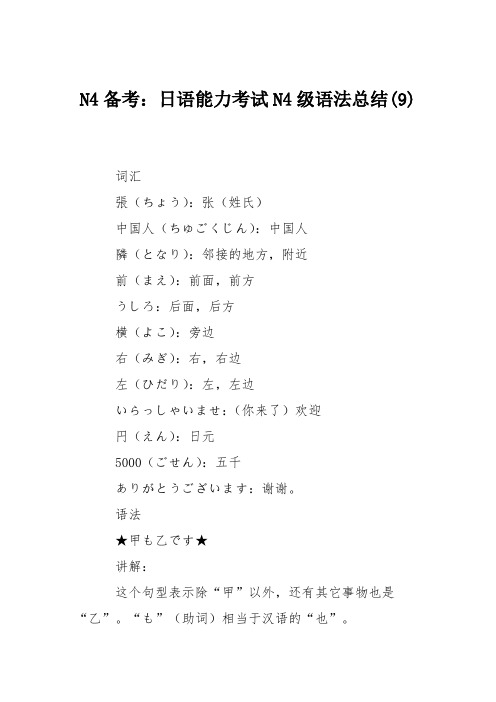
N4备考:日语能力考试N4级语法总结(9)词汇張(ちょう):张(姓氏)中国人(ちゅごくじん):中国人隣(となり):邻接的地方,附近前(まえ):前面,前方うしろ:后面,后方横(よこ):旁边右(みぎ):右,右边左(ひだり):左,左边いらっしゃいませ:(你来了)欢迎円(えん):日元5000(ごせん):五千ありがとうございます:谢谢。
语法★甲も乙です★讲解:这个句型表示除“甲”以外,还有其它事物也是“乙”。
“も”(助词)相当于汉语的“也”。
例句:わたしは中国人です。
(我是中国人)張さんも中国人です。
(张也是中国人)★表示位置关系的词语★讲解:隣(となり):距基准点最近的两侧。
相当于汉语的“邻接的地方”。
前(まえ):基准点的视线所指方向。
相当于汉语的“前面,前方”。
うしろ:基准点之后,相当于汉语的“后边,后面”。
横(よこ):基准点的左右两侧。
相当于汉语的“旁边”。
右(みぎ):相当于汉语的”右,右边”。
左(ひだり):相当于汉语的“左,左边”。
★いらっしゃいませ★讲解:客人到商店或公司等处时,主人对来客说的寒暄语。
相当于汉语的“你来了”表示欢迎。
例句:店員:いらっしゃいませ。
(欢迎)田中:テレビの売り場はここですか?(电视的柜台在这吗?)店員:はい,そうです。
(是的,在这)★いくらですか★讲解:询问物品价钱的说法,相当于“多少钱?”。
可以用“~はいくらですか?”的形式,也可以手拿物品用“いくらですか”的形式。
★~をください★讲解:在商店里想买某种商品时使用。
意思是“把~卖给我吧”。
表示动作的对象时,在表示对象的词语之后要加上助词“を”。
★~円いただきます★讲解:卖方向买方说的话。
“~”的部分带入价钱,表示“收你~钱”。
例句:田中:そのワイシャツはいくらですか?(那件衬衫多少钱?)店員:これは5000円です。
(这件5000〔日〕元)田中:それをください。
(给我那个)店員:ありがとうございます。
5000円いただきます。
国考小语种考试大纲word版
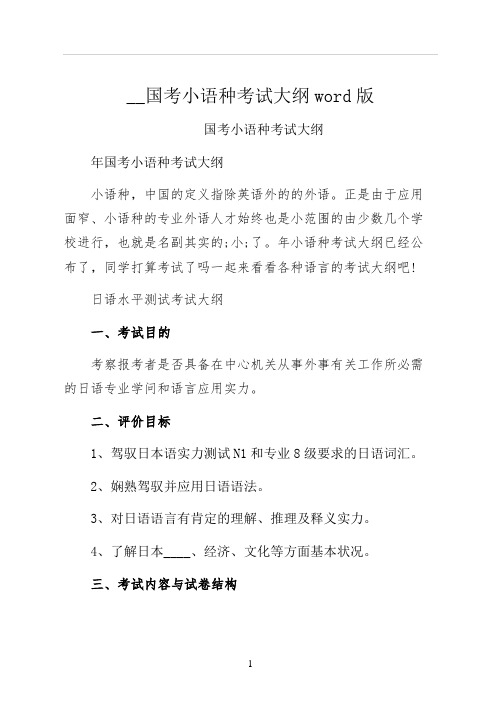
__国考小语种考试大纲word版国考小语种考试大纲年国考小语种考试大纲小语种,中国的定义指除英语外的的外语。
正是由于应用面窄、小语种的专业外语人才始终也是小范围的由少数几个学校进行,也就是名副其实的;小;了。
年小语种考试大纲已经公布了,同学打算考试了吗一起来看看各种语言的考试大纲吧!日语水平测试考试大纲一、考试目的考察报考者是否具备在中心机关从事外事有关工作所必需的日语专业学问和语言应用实力。
二、评价目标1、驾驭日本语实力测试N1和专业8级要求的日语词汇。
2、娴熟驾驭并应用日语语法。
3、对日语语言有肯定的理解、推理及释义实力。
4、了解日本____、经济、文化等方面基本状况。
三、考试内容与试卷结构考试形式为笔试,考试时间120分钟,总分100分。
试题由以下三部分组成:1、词汇和语法40题2、完形填空20题3、阅读理解20题四、答题要求考试均采纳客观性试题,要求报考者从每题所给的选项中选择一个最佳答案,或依据要求选择最佳搭配。
报考者应在专用答题卡上作答,作在试卷上的答案一律无效。
法语水平测试考试大纲一、考试目的考察报考者是否具备在中心机关从事外事有关工作所必需的法语专业学问和语言应用实力。
二、评价目标1、驾驭与中国及法语国家和地区相关的`外交、经济、文化、历史、科技、社会生活、时事____等领域常用法语词汇。
2、具备良好的法语语言功底,驾驭法语基本语法规则、词语搭配和常用表达方式。
3、能较快读懂法语原文报刊各类文章,把握文章主要内容、观点和结构。
4、驾驭基本的外事和时事有关学问。
三、考试内容与试卷结构考试形式为笔试,考试时间120分钟,总分100分。
试题由以下三部分组成:1、词汇和语法40题2、完形填空20题3、阅读理解20题四、答题要求考试均采纳客观性试题,要求报考者从每题所给的选项中选择一个最佳答案,或依据要求选择最佳搭配。
报考者应在专用答题卡上作答,作在试卷上的答案一律无效。
俄语水平测试考试大纲一、考试目的考察报考者是否具备在中心机关从事外事有关工作所必需的俄语专业学问和语言应用实力。
- 1、下载文档前请自行甄别文档内容的完整性,平台不提供额外的编辑、内容补充、找答案等附加服务。
- 2、"仅部分预览"的文档,不可在线预览部分如存在完整性等问题,可反馈申请退款(可完整预览的文档不适用该条件!)。
- 3、如文档侵犯您的权益,请联系客服反馈,我们会尽快为您处理(人工客服工作时间:9:00-18:30)。
文官制度改革寡头政治;寡头统治;寡头统治的国家n[U]暴政;|C,U]暴君统治的国家n作用;功能;职能;职责adv•专断地;权威地vt使(某人)做某事;强迫公共收入公债利益集团商业投机行为n独占;控制劳工法宪政原则n暴君n [C]总督n[U|管理;监督;主管n按日给出津贴;出差津贴邮政服务州政府联邦政府adj不偏不倚的;公正的;中立的n办公室adv到目前为止高度集权髙度分权官僚主义狂热n特许权;获特许权的企业或机构国民同意n政治组织;国家组织;政治;adj贵族的;贵族气派的一个贵族享有特权的政体政体Part 1: Professional Words and Terms civil service reformscrutinyrskrutani|the history of systematic thought dogmatize[v d gmata z] sovereigntvr nt ] the essence and seat of sovereignty popular power prerogative [pr f r gat v] kingly prerogative controvers kantra f vasi| monarchy「m nok ]n.|U|细察;详审系统思想史v・教条或武断地表达;论证n. |U|主权:君权主权的本质与地位人民的权力,民间力量n.权利;(尤指)特权君主特权n |U,C|公开辩论;论战n・君主政体;君主制;君主国democracy|d *in kras |n [U|民主;民主政体;民主制度[C]民主国家oligarchy rala f garki| tyrannrani]function imperatively! m'pc忖tvli| coinpel|kdin v pel| publicrevenues |f revanju:| publicdebts [det] vested interestscommercial speculationmonopoly |m3!napali| theStatute of Laborersconstitutional principledespot[f desp t] satrap rsaetnep]superintendence per diem[pada om] postal service authoritystate federal governmentimpartial) m'par al| bureaux「b juarau| hitherto[,hida'tu]highly centralized highlydecentralized bureaucraticfever franchise[f fr3ent aiz]popular assent[d Y sent] polityaristocratic [,aerist9f kracti k] apolity of aristocratic privilegeabsolute government在损失或损坏某事物的情况下adj•逻辑(上)的,符合逻辑的vt.命令, 扌决;颁布…为法令well-being principally popular sovereignty enthrone[in f 0 m n; en-| reign [re n] expertness 「kspa:tnis] reason axiom「acks am| fellowcitizens makeshift apotheosis 0 i'o sis| doctrine 「d ktrin) counting house unpartisan [ n'paztizaen] businesslike statutory [staetj tari] cnactmcnt|i9naektindnt| 政治批判;党派评论despotic[di v sp tik] patcrnallpa^tdnl] remunerative |ri f injun3rativ|liberal principles exempt [ig'zempt] general weal profess |pr9f fcs| symmetrical divisions of territory adj专制暴君的;专横的adj家长式管制的adj付酬的;有利可图的自由主义原则vt使免除(豁免)公共福利Vt声称;宣称;公开表明行政区划均匀the Constituent Assemblyherald 「h raid] civilmachinery [ma1 inari] a constitutional era[f ira| at the expense of prejudice|f pred dis| logical decree |d f kri | unlimited authority the year VI theAngevin/aend ivin| the Great Charter executive power vvcll-ordcrcd legislative Tied isbtiv|law-making制宪会议vi预示市政机器宪政时代m成见,偏见,歧视无限权力共和八年安茹王朝(1154-1216) n•英国大宪章(1215)执行力;行政权力adj.秩序井然的adj.立法的制定法律political criticism kritisizam]n康乐,安康;福利adv.主要地人民的主权(统治权)vt.使(国王、女王或主教)登基,即位n.任期;当政期n・专门性n・理性,理智n・公理;自明之理;格言市民们,公民们,同胞们11 •权宜之计,临时代用的物品n・尊为神圣*神化;美化n・教条,教义,学说n・会计室,账房,存账室adj.无党派性的;无偏见的adj•事务性的,有条理的,有效率的adj.依照法令的,法定的n.演出;展现;规定;通过jurisdiction[,d ris f dik on]m司法权;裁判权;管辖区域;管辖范围hither and thither 到处;向各处;忽此忽彼bring to book meed [mi d] authoritative critic| superintend [^supar candidate [ kaend10 r tatn*t nd] d t]apparatus! aepa raetss] a corps of civil servants appropriatehierarchy Q proprit| Tha ararki| characteristic disciplinelkaerakta'r st semi-corporate 「semi k rparat] the meanness of abigoted officialism officialism Q'f al zom]propose|pra f pa z| permanent officials 「p manantlrank and file perfunctory [p 'f gkt^ri] public counseipka nsl| personal government legitimate|1 *d t inat| denounce [d f na ns| the federal supremecourt tenetpten t] Patriotic | pe tri 1 t k|preconception peppercorn 「pepak dye in the wooltouchstone doctrinaire|9d ktr sanction 「saeqk an]conclusive imperial federation审查;盘问;惩罚某人n.〈古〉报酬,奖赏 v|权威性批判,权威性评论 讥•管理,监督,主管n.申请求职者,候选人;报考者 n(尤指政党或政府的)机构,组织 一支文官队伍适当的级别 特有的纪律半社团的k] 偏执的文牍主义式的卑劣行径 11 •官僚作风,官僚习气,官样文章 vt.&vi 提议,建议 常任文官 普通成员,士兵 adj.敷衍的,例行公事的;肤浅的 公开协商 个人独裁政府 adj.合情合理的;合法的 vt •公开指责;揭发;告发 联邦最高法院n ・原则,信条,教义,教条adj •爱国的,有爱国心的 n •事先形成的观点或思想,先入之见n •胡椒子,微不足道的东西坚定的(政治信仰)n ・试金石,(检验)标准adj.教条的,空谈理论的vt ・批准;认可adj.令人信服的,确凿的I m f p x 汕 帝国联邦n]fnea|burcaucratrbj ^rgkract] n ・官僚,官僚主义者,官僚作风的人 esprit de corps|es v pri:d3v k :r| ingratiate) n f gre e t| obeisance [a f be sans] confederation [kanfeda 1 re (a)n] honorarn (9)(e)r ]honorable|v andrdb31| subordination [s%b d f ne n| civil liberty ['lib 筑i]n •团体精神 vf ・讨好,谄媚 n.服从n.结盟;同盟,联邦adj.名义上的,诚信的 adj.可敬的,荣誉的,光荣的 n ・下属,隶属关系n •公民自由Part 1: Professional Words and Termsconcrete government judicial|d f d al| judicial authorities executive authorities 具体政府;实体政府adj •法庭的;法官的;审判的司法权威机关 行政决策机关administrative authorities 行政管理机关designate 「dez gne t] adj. 已受命(而尚未就职)的;任命;指派patronage) pe trail d | public patronage parlance[v parhns| vetoTvi ta ]speculation[9spekj f lc n] expediency! k'spid ansi) practical expediency viz [v z] brutum fulmenheretofore[h at 'f unyieldingl n'ji IdIK 支持,赞助,资助 公职任职权 n ・用法;说法n 否决权;否决:否决某事物的陈述 11.思索,探讨 n ・适宜,有利,利己便于实践adv. <正,书 >即;就是n.空雷不雨,虚张声势;一纸空文 adv.在此之前;迄今;迄今为止Iq|adj ・不易变形的;(喻)固执的;不屈从的Part 1: Professional Words and Terms• initiative ) f n ot v| • incentive | n f sant v| • deliberately[d ‘1 baratli] •ingenuity!, nd a'nudti]I regularity|regj 恤mt spasmodically [spaez Y m by far knack [nxk] rule of thumb [ 0 m resent[rfzent] opposition) po'z ihand overnumerical|nju !mer intricate!9 ntr kat] immense! f mens] prcccdc[pr f si d| doveta训'd vte 1| discorded skd] illustration b h'streG)n] n.创始力;初步的阶段或行动n.激励性;刺激;动机adv •故意地;(行动、言语等)从容而谨慎的 n.聪明才智;灵巧;机敏n.规律;经常;定期d kli] adv.时作时停地;断断续续地 大量;甚多 n.(直觉的或由练习而得的)技巧;决窍 凭感觉的方法;单凭经验的方法 vt.对……感觉不愉快;愤恨;怨恨n.反对;敌对;相反 将某人交给当局;交给他人 数字的;数字上的;表示数量的 adj.复杂的;使人迷惑的;难了解的 adj.极大的vi.在前;居先;先于 vt./vi.(喻)吻合;密合 n.不和谐;不一致n.举例或以图表说明;例证an]adv •独裁地等级从属关系 v ・规定;命令;指不 Il •先决[必要I 条件,前提(to, for)按……的本性,好像 m 报酬,薪水 !!・门槛;〈喻〉开始adj •相等的,相当的自由劳工契约n ・义务;责任 adj •祖传的;世袭的 adj.冷淡的;客观的文化价值观念n ・[德]代用品decreePart 2: Professional Words and TermsOfficialdom [Jf lddin| modernofficialdom jurisdictional|,d ar s f d k anl] jurisdictional area 「cor 3] administrative regulations coercive mcans[kdu v d :siv] fulfillinent feudal structure[f fjudl| personal trustees [tr s f tiz] tablecompanions[kam Y paenjdnz] con "servant office hierarchy levels of graded authority subordination[sa ?b d T ne n]n ・官场,官僚作风,官员 现代官僚;现代官员 讪•司法权的,管辖权的 管辖范围 行政法规强制手段11 •履行,实行封建国家结构 个人的委托人 同伙职位层级化 权力等级n ・服从,附属,从属关系monocraticallyhm nAkraet kl |hierarchical subordinationincumbent! n f k inbant| draught form [dra ft] subaltern|sd f b ltdn] subaltern officials business assets「aesets|private fortunes 「pra vat|rt intrinsically! n f tr ns kali] presupposeobligaton|91bl gat (9)r ] discharge exhaustive! g fz st v]jurisprudence[9d ar s f prudns]n.(教会中的)任职者草稿 adj •下的,副的,次的 辅助性官职企业财产QHZ ]私人财产adv.固有地,内在地讥•预先假定;推测,以・・・为前提 adj •必须的,必要的;要求的vt ・・执行;履行adj •全面的,彻底的,透彻的!!・法学,法理学n.命令,法令,政令patrimonialism|9pactn v mdunidlizdm| n.家产制;世袭制prescrib e|prfskra b|prerequi site|pri 'rekw zt| in the nature of emolument | f m ljumdnt] Threshold[* 0 re ,ho ld| equivalent) f kw valant| free labor contracts obligation^ bl f ge an] patrimonial! paetr f m3 njdl| impersonal) m'po s(d)n(d)l] ideas of culture-values ersatz 「gsaets]monocratically organized强制规范化adj.人造的,合成的adj •世俗的,尘世的;肉身的ndein| adj •远离俗世的 kl| Qdj •意识形态的n ・魅力,魔力vt.使程序化[常规化,习惯化]讥・尊敬;使神圣Vi ・努力;竞争,斗争;反抗n.尊敬;好评V ] adj.规定的;惯例的;约定俗成的 等级秩序的规章n.侮辱;凌辱;无礼 n •鄙[蔑,轻,藐]视vi ・流行,盛行,风行社会分化 由…起源 n.(组织的)层,社会阶层因袭的身份地位adv.明白地,明确地adv •无感情地,理智地 n ・候选人;考生 陆军军官团m 行会,同业公会,协会行会式的封闭adj.受俸的讥•使复活;复兴;重现n •无产阶级,劳工m 优势;支配地位;控制力 由于(因为);凭借…的力量牟利it.成层;层理社会分层n.鼓掌通过;称赞,欢呼 n •候选人;候补人;投考生vt. & vi.修改,更改adj.自治的n •门外汉,外行人 决定性作用vt.报答;归还;给予;呈递 m调拨,调配,促成n.候选人名单,提名名单 adv.充分地;基本上n ] n ・区别,差别;划分 ndntli ]adv.主要地,显著地,突出地carthlvsuprainundane|9sju:prd v in ideological [用 d aH d charisma[k3f rzma]routinize[ru:Y ti:na z] hallow Phaek ] strive |stra v| esteem[ f stim] prescriptive [pr 'skr pt rules ofrank order insult | n !s It] contempt|kan f tein(p)t| prevail|pri f veil] differentiation [,d faren social differentiation predominantly[pr 'd in derive from |di Y raiv| strata 「stra ta| statusconventions[f ste tas| explicitly!k'spl s tli] impassively! m !paes vli] aspirant |a T spa arant| office corps guild[g Id] guild-likeclosure[f kh a] prcbcndal|pri v bcndl| resurrect] rez3f rekt| proletarian [,pr3 1 T tear dn] dominance[v d m nans] by virtue of]'、。
